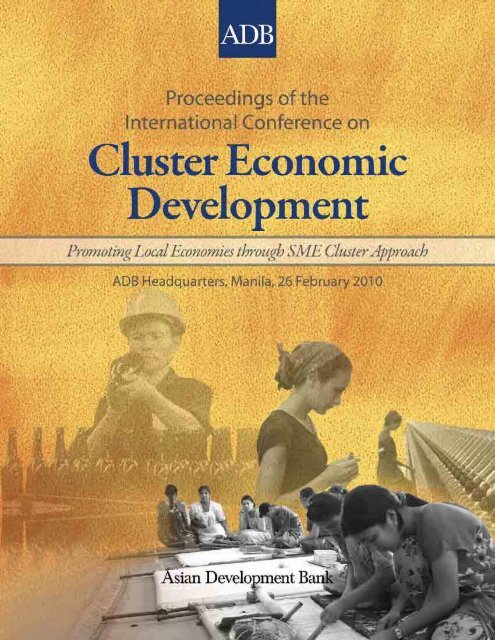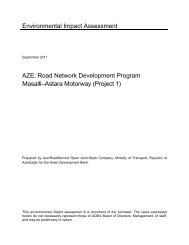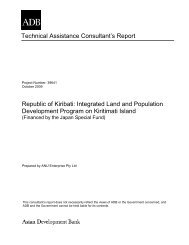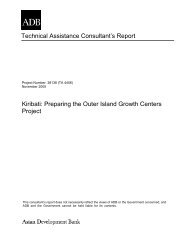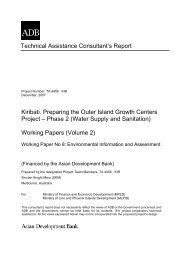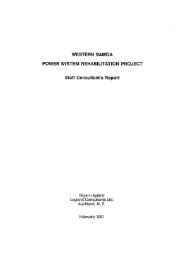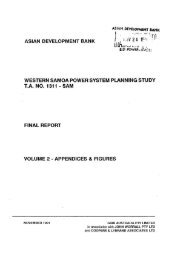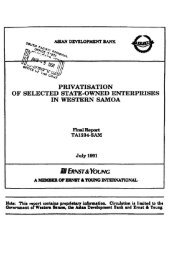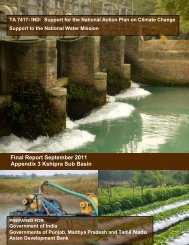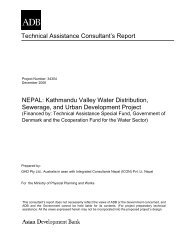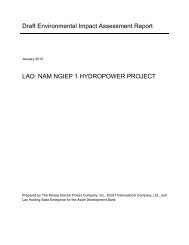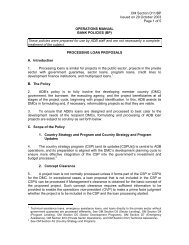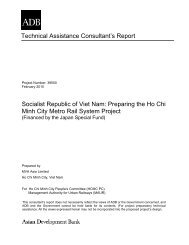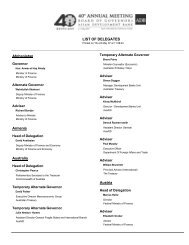international conference on cluster economic development - Asian ...
international conference on cluster economic development - Asian ...
international conference on cluster economic development - Asian ...
Create successful ePaper yourself
Turn your PDF publications into a flip-book with our unique Google optimized e-Paper software.
TABLE OF CONTENTS<br />
Page<br />
Acr<strong>on</strong>yms 3<br />
Executive Summary 4<br />
I. Background 6<br />
II. Opening Sessi<strong>on</strong> 6<br />
III. Keynote Speech: Industrial Clusters and SMEs for Achieving the<br />
Millennium Development Goals by Mr. Jebamalai Vinanchiarachi<br />
IV. Special Lecture: Clusters and Cluster Policy by Professor Christian H.M.<br />
Ketels<br />
7<br />
V. Sessi<strong>on</strong> 1: Examples of Successful Industry Clusters 8<br />
VI. Sessi<strong>on</strong> 2: Examples of Eco-Clusters 10<br />
VII. Sessi<strong>on</strong> 3: Promoting Local Ec<strong>on</strong>omies through SME Cluster Approach<br />
VIII. Sessi<strong>on</strong> 4: Panel Discussi<strong>on</strong> <strong>on</strong> Poverty-Innovati<strong>on</strong>-Sustainability: How<br />
to Integrate Clusters in Sustainable Development<br />
IX. Closing Sessi<strong>on</strong> 15<br />
Annex A: C<strong>on</strong>ference Agenda<br />
Annex B: List of Participants<br />
Annex C: Profile of Speakers and Panel Members<br />
Annex D: Welcoming Remarks by DG/SARD, Mr. S.H. Rahman<br />
Annex E: Opening Address by Managing Director General, Mr. Rajat Nag<br />
Annex F: Key Note Speeches<br />
a) Industrial Clusters and SMEs for Achieving the Millennium Development<br />
Goals by Mr. Jebamalai Vinanchiarachi<br />
b) Special Lecture: Clusters and Cluster Policy by Professor Christian H.M.<br />
Ketels<br />
Annex G: Sessi<strong>on</strong> 1-Presentati<strong>on</strong> slides by Resource Speakers<br />
a) Industrial Clusters and Regi<strong>on</strong>al Development Policy in Asia by<br />
Venkatachalam Anbumozhi<br />
b) Main Determinants of Competitive SME Clusters: The Ind<strong>on</strong>esian Story<br />
by Tulus Tambunan, Director, Center for Industry and SME Studies,<br />
University of Trisakti<br />
c) Implementing Sustainable Clustering Projects and Policies: Less<strong>on</strong>s<br />
Learned from 20 years in the Field by Eric Hansen, President,<br />
Ec<strong>on</strong>omic Transformati<strong>on</strong>s Group, Inc., United States<br />
7<br />
12<br />
13<br />
2
Annex H: Sessi<strong>on</strong> 2-Presentati<strong>on</strong> slides by Resource Speakers<br />
a) Eco-Clusters and Eco-Centers: Defining the ‘Eco’ in Industrial Systems<br />
by Andreas W. Koenig, Eco-Industry & Re-Tem Corp., Tokyo<br />
b) Eco-Industrial Networking of the Rice and Livestock Sector at<br />
Chachoengsao Province in Thailand by Chettiyappan Visvanathan,<br />
Professor, <strong>Asian</strong> Institute of Technology, Bangkok<br />
c) Wood Industrial Cluster in Japan: Effective Wood Resources Utilizati<strong>on</strong><br />
in Maniwa by Masaki Kojima, Director, Zero-Emissi<strong>on</strong> Support Institute,<br />
Japan<br />
d) Philippine Eco-Industrial Z<strong>on</strong>e Development by Dr. Anth<strong>on</strong>y S.F. Chiu,<br />
Professor, Center for Engineering and Sustainable Development<br />
Research, De la Salle University Manila<br />
Annex I: Sessi<strong>on</strong> 3-Presentati<strong>on</strong> slides by Resource Speakers<br />
a) City Cluster Ec<strong>on</strong>omic Development Strategy by Dr. Kye<strong>on</strong>gAe (Kay)<br />
Choe, Lead Professi<strong>on</strong>al (Water and Urban Development), ADB<br />
b) Framework for Ec<strong>on</strong>omic Development Approach: How to Identify<br />
Clusters and their Potentials for Growth by Brian Roberts, Director,<br />
Strategic Planning and Management Services<br />
c) Boosting the Envir<strong>on</strong>mental and Ec<strong>on</strong>omic Competitiveness of SME<br />
Clusters by Venkatachalam Anbumozhi, Capacity Building Specialist,<br />
ADB Institute<br />
Annex J: Group Pictures with Participants and C<strong>on</strong>ference<br />
ACRONYMS<br />
ADB <strong>Asian</strong> Development Bank<br />
CCED city <strong>cluster</strong> ec<strong>on</strong>omic <strong>development</strong><br />
CED <strong>cluster</strong> ec<strong>on</strong>omic <strong>development</strong><br />
EIC eco-industrial <strong>cluster</strong><br />
EID eco-industrial <strong>development</strong><br />
MDG millennium <strong>development</strong> goals<br />
SME small and medium enterprises<br />
UNIDO United Nati<strong>on</strong>s Industrial Development Organizati<strong>on</strong><br />
3
EXECUTIVE SUMMARY<br />
The Internati<strong>on</strong>al C<strong>on</strong>ference <strong>on</strong> Cluster Ec<strong>on</strong>omic Development: Promoting Local<br />
Ec<strong>on</strong>omies through SME Cluster Approach was held at ADB Headquarters in Manila <strong>on</strong> 26<br />
February 2010. Over 70 representatives from the governments of Bangladesh, Cambodia,<br />
India, Ind<strong>on</strong>esia, Lao PDR, Nepal, Pakistan, Philippines, Sri Lanka, and Viet Nam;<br />
<str<strong>on</strong>g>internati<strong>on</strong>al</str<strong>on</strong>g> <strong>development</strong> agencies and organizati<strong>on</strong>s; academe; n<strong>on</strong>-government<br />
organizati<strong>on</strong> (NGO), the private sector; and ADB participated in the <str<strong>on</strong>g>c<strong>on</strong>ference</str<strong>on</strong>g>.<br />
The <str<strong>on</strong>g>c<strong>on</strong>ference</str<strong>on</strong>g> aims to (i) provide an overview of <strong>cluster</strong> ec<strong>on</strong>omic <strong>development</strong> (CED) as a<br />
new paradigm for local ec<strong>on</strong>omic <strong>development</strong>, (ii) show some examples of good practices<br />
of small and medium enterprise (SME) <strong>cluster</strong>s, and (iii) c<strong>on</strong>tribute to the <strong>on</strong>going discussi<strong>on</strong><br />
<strong>on</strong> using the <strong>cluster</strong> approach as an example of CED applicati<strong>on</strong>.<br />
Mr. Sultan Hafeez Rahman, Director General of South Asia Department welcomed<br />
everybody. Mr. Rajat M. Nag, Managing Director General of ADB, delivered his opening<br />
address. Mr. Jebamalai Vinanchiarachi, former Principal Adviser to the Director General of<br />
UNIDO, delivered the keynote speech <strong>on</strong> the role of SMEs and industrial <strong>cluster</strong>s in<br />
achieving the millennium <strong>development</strong> goals (MDG). On video, Professor Christian H.M.<br />
Ketels of the Harvard Business School discussed the c<strong>on</strong>ceptual framework of <strong>cluster</strong>s and<br />
<strong>cluster</strong> policy.<br />
Presentati<strong>on</strong>s and discussi<strong>on</strong>s were structured into four sessi<strong>on</strong>s: (i) Examples of<br />
Successful Industry Clusters, (ii) Examples of Eco-Clusters; (iii) Promoting Local Ec<strong>on</strong>omies<br />
through SME Cluster Approach, and (iv) Panel Discussi<strong>on</strong> <strong>on</strong> Poverty-Innovati<strong>on</strong>-<br />
Sustainability: How to Integrate Clusters in Sustainable Development. Sessi<strong>on</strong>s 1 and 2<br />
cited specific experiences <strong>on</strong> <strong>cluster</strong>s from various countries. Sessi<strong>on</strong> 3 explained the city<br />
<strong>cluster</strong> ec<strong>on</strong>omic <strong>development</strong> (CCED) approach, and the policies <strong>on</strong> and challenges facing<br />
SME <strong>cluster</strong>s in Asia. The last sessi<strong>on</strong> attempted to synthesize the presentati<strong>on</strong>s and<br />
discussi<strong>on</strong>s by focusing <strong>on</strong> how the CCED approach could be operati<strong>on</strong>alized and how it<br />
would be financed.<br />
Key points that emerged from the <str<strong>on</strong>g>c<strong>on</strong>ference</str<strong>on</strong>g> include the following:<br />
� The elements of <strong>cluster</strong>s are geography or spatial proximity, linkages or similarity of<br />
ec<strong>on</strong>omic activities and interacti<strong>on</strong> between the firms, whose grouping together are<br />
driven by externalities such as public policy, market, infrastructure, knowledge<br />
spillovers, and comm<strong>on</strong> desire to be competitive.<br />
� In Asia, public policy plays a big role in the <strong>development</strong> and strengthening of SME<br />
<strong>cluster</strong>s. Linkage of <strong>cluster</strong>s to market opportunities is also crucial to their<br />
<strong>development</strong>.<br />
� Experiences have shown that <strong>cluster</strong>s can promote ec<strong>on</strong>omies of scale, foster<br />
efficiency in managing resources (e.g., eco-<strong>cluster</strong>s), and enhance competitiveness<br />
through specializati<strong>on</strong>.<br />
� Sustainability requires that the ec<strong>on</strong>omic benefits of industrial <strong>cluster</strong>s outweigh or<br />
help mitigate their envir<strong>on</strong>mental costs. Promoti<strong>on</strong> and use of appropriate<br />
technologies by firms is very important.<br />
� The framework of analysis for CCED helps to answer the questi<strong>on</strong>s, Where to invest<br />
first and What to invest, thereby helping policymakers, investors, and d<strong>on</strong>ors to make<br />
informed decisi<strong>on</strong>s <strong>on</strong> strategic investments that maximize intended impact and<br />
benefits.<br />
� CCED has potentials for fostering ec<strong>on</strong>omic growth through job creati<strong>on</strong> and<br />
4
increased income, thereby c<strong>on</strong>tributing to poverty reducti<strong>on</strong>. In this c<strong>on</strong>text, ecoindustrial<br />
networking will be important, with government funding and policy initiatives<br />
tackling the ec<strong>on</strong>omies of scale issue.<br />
� Coordinati<strong>on</strong> is <strong>on</strong>e of the key elements in operati<strong>on</strong>alizing the CCED approach<br />
because it needs a multi-sector and multi-level engagement.<br />
C<strong>on</strong>ference <strong>on</strong> Cluster Ec<strong>on</strong>omic Development: Promoting Local Ec<strong>on</strong>omies through<br />
SME Cluster Approach<br />
Cluster ec<strong>on</strong>omic <strong>development</strong> provides a framework to unleash the potential of SMEs,<br />
accelerate local ec<strong>on</strong>omic <strong>development</strong>, and help reduce poverty in rapidly urbanizing Asia.<br />
The <str<strong>on</strong>g>c<strong>on</strong>ference</str<strong>on</strong>g> underscored the importance of using the industry <strong>cluster</strong> approach to<br />
promote growth of local ec<strong>on</strong>omies.<br />
5
I. BACKGROUND<br />
Cluster is a local agglomerati<strong>on</strong> of firms or enterprises producing related, complementary, or<br />
similar products or services. City <strong>cluster</strong> ec<strong>on</strong>omic <strong>development</strong> (CCED) is a local ec<strong>on</strong>omic<br />
<strong>development</strong> approach that seeks to enhance the ability of cities to promote ec<strong>on</strong>omic<br />
growth in an extended urban-regi<strong>on</strong>. The framework of analysis of the CCED approach<br />
helps to answer the questi<strong>on</strong>s, Where to invest first and What to invest, thereby helping<br />
policymakers, investors, and d<strong>on</strong>ors to make informed decisi<strong>on</strong>s <strong>on</strong> strategic investments<br />
that produce the greatest intended impact.<br />
In 2009 ADB initiated a study under RETA 6337: Subproject 7: City Cluster Ec<strong>on</strong>omic<br />
Development in South Asia. The result of the study provides a background for the<br />
<str<strong>on</strong>g>c<strong>on</strong>ference</str<strong>on</strong>g>, which is the first <str<strong>on</strong>g>internati<strong>on</strong>al</str<strong>on</strong>g> gathering organized by the <strong>Asian</strong> Development<br />
Bank (ADB) to discuss CCED, particularly the <strong>cluster</strong>ing of small and medium enterprises<br />
(SMEs).<br />
The <str<strong>on</strong>g>c<strong>on</strong>ference</str<strong>on</strong>g> aims to (i) provide an overview of <strong>cluster</strong> ec<strong>on</strong>omic <strong>development</strong> (CED) as a<br />
new paradigm for local ec<strong>on</strong>omic <strong>development</strong>, (ii) show some examples of good practices<br />
of small and medium enterprise (SME) <strong>cluster</strong>s, and (iii) c<strong>on</strong>tribute to the <strong>on</strong>going discussi<strong>on</strong><br />
<strong>on</strong> using the <strong>cluster</strong> approach as an example of CED applicati<strong>on</strong> (see Annex A:<br />
C<strong>on</strong>ference Agenda). The <str<strong>on</strong>g>c<strong>on</strong>ference</str<strong>on</strong>g> gathered over 70 representatives from the<br />
governments of Bangladesh, Cambodia, India, Ind<strong>on</strong>esia, Lao PDR, Nepal, Pakistan,<br />
Philippines, Sri Lanka, and Viet Nam; <str<strong>on</strong>g>internati<strong>on</strong>al</str<strong>on</strong>g> <strong>development</strong> agencies and<br />
organizati<strong>on</strong>s; academe; n<strong>on</strong>-government organizati<strong>on</strong> (NGO); the private sector; and ADB<br />
(see Annex B: List of Participants). The profile of speakers and panel members is in<br />
Annex C.<br />
II. OPENING<br />
Ms. (Kay) Kye<strong>on</strong>gAe Choe, Lead Professi<strong>on</strong>al (Water and Urban Development), ADB,<br />
opened the <str<strong>on</strong>g>c<strong>on</strong>ference</str<strong>on</strong>g>. Mr. Sultan Hafeez Rahman, Director General of ADB's South Asia<br />
Department, welcomed the participants. Mr. Rahman said that the <strong>cluster</strong> approach could be<br />
used to trigger the growth and <strong>development</strong> of SMEs. Further, increasing the<br />
competitiveness of SMEs could fuel private sector <strong>development</strong>, which is a key to reducing<br />
poverty in the Asia and Pacific regi<strong>on</strong>. The approach is particularly relevant to Asia, which<br />
experiences rapid urbanizati<strong>on</strong>. Some critical issues for c<strong>on</strong>siderati<strong>on</strong> involve identifying<br />
growth areas in urban-rural areas, accelerating SME and private sector <strong>development</strong>, and<br />
sustaining large-scale infrastructure <strong>development</strong> amidst availability of limited resources. Mr.<br />
Rahman noted that the <strong>cluster</strong> approach offers an alternative framework for addressing<br />
these issues and expressed hope that the <str<strong>on</strong>g>c<strong>on</strong>ference</str<strong>on</strong>g> would provide a venue for finding<br />
soluti<strong>on</strong>s to these challenges. (Annex D).<br />
Mr. Rajat M. Nag, Managing Director General of ADB, delivered the opening address. He<br />
said that Asia was in a period of rapid urbanizati<strong>on</strong>, which brings benefits and also presents<br />
complex challenges. Resources for <strong>development</strong> have been stretched tightly, thus the need<br />
to target <strong>development</strong> assistance and to look for areas where <strong>development</strong> impacts can<br />
have immediate effects. SMEs are increasingly recognized as major drivers of ec<strong>on</strong>omic<br />
growth, employment and income generati<strong>on</strong>, and poverty reducti<strong>on</strong>. Therefore, it is critical<br />
6
for governments to devise effective strategies for CCED. The CCED is a local ec<strong>on</strong>omic<br />
<strong>development</strong> strategy that promotes the use of limited resources for maximum <strong>development</strong><br />
impact. It is a new paradigm for promoting industry <strong>development</strong> and fostering<br />
competitiveness of cities. CCED provides a useful analytical framework for the <strong>development</strong><br />
of SMEs and for making investment decisi<strong>on</strong>s-- where to invest first and what to invest to<br />
maximize resources. Mr. Nag challenged the participants to c<strong>on</strong>sider how <strong>Asian</strong> countries<br />
could accelerate progress in ec<strong>on</strong>omic growth and poverty reducti<strong>on</strong>. In c<strong>on</strong>clusi<strong>on</strong>, Mr. Nag<br />
expressed his wish that the <str<strong>on</strong>g>c<strong>on</strong>ference</str<strong>on</strong>g> would promote further initiatives to create a<br />
competitive envir<strong>on</strong>ment for SME <strong>cluster</strong>s in Asia. (Annex E).<br />
III. KEYNOTE SPEECH: SMEs AND INDUSTRIAL CLUSTERS FOR ACHIEVING<br />
MDGs<br />
Mr. Jebamalai Vinanchiarachi, former Principal Adviser to the Director General of UNIDO,<br />
delivered the keynote speech. He said that by creating jobs, SMEs and industrial <strong>cluster</strong>s<br />
could play a big role in fostering inclusive growth espoused by the Millennium Development<br />
Goals (MDGs). Breaking the poverty trap needs foreign direct investment and technology<br />
diffusi<strong>on</strong>. ADB’s Strategy 2020 is relevant to MDGs because it focuses <strong>on</strong> private sector<br />
<strong>development</strong>, good governance, regi<strong>on</strong>al integrati<strong>on</strong>, etc.<br />
Mr. Vinanchiarachi cited some country experience showing that targeting communities and<br />
commodities can lead to poverty alleviati<strong>on</strong>. A humanitarian program in Sudan focusing <strong>on</strong><br />
isolated villages used grassroots innovati<strong>on</strong>s and provided vocati<strong>on</strong>al training and livelihood<br />
programs. Good practices of the program were replicated in Timor Leste. Targeting<br />
commodities, as in the case of the butt<strong>on</strong> city in the People’s Republic of China and the milk<br />
producti<strong>on</strong> and processing in Nicaragua, can also create positive impacts <strong>on</strong> poverty<br />
alleviati<strong>on</strong>. Growth follows networking with <strong>development</strong> partners and boosting<br />
competitiveness.<br />
Mr. Vinanchiarachi emphasized that urbanizati<strong>on</strong> is good for industry <strong>development</strong> because<br />
agglomerati<strong>on</strong> of firms promotes ec<strong>on</strong>omies of scale, creates competitive pressures and<br />
fosters informati<strong>on</strong> sharing for efficiency gains, and better influences the policy dialogue. As<br />
a way forward, he suggested establishing <strong>cluster</strong> parks and comm<strong>on</strong> facilities through<br />
public-private partnerships, enhancing the role of regi<strong>on</strong>al <strong>development</strong> agencies, and<br />
strengthening the regi<strong>on</strong>al industrial innovati<strong>on</strong> system. (Annex F.a).<br />
IV. SPECIAL LECTURE ON CLUSTERS AND CLUSTER POLICY<br />
On video, Professor Christian H.M. Ketels of the Harvard Business School talked about the<br />
c<strong>on</strong>ceptual framework of <strong>cluster</strong>s and <strong>cluster</strong> policy. He explained three dimensi<strong>on</strong>s of<br />
<strong>cluster</strong>s--geography or spatial proximity, industrial linkages (group of ec<strong>on</strong>omic activities),<br />
and interacti<strong>on</strong> between actors (public and private instituti<strong>on</strong>s)--whose dynamics are driven<br />
by local externalities. Clusters, al<strong>on</strong>g with urbanizati<strong>on</strong> and quality business envir<strong>on</strong>ment,<br />
c<strong>on</strong>tribute to prosperity. Regi<strong>on</strong>s which have specializati<strong>on</strong> tend to do better in terms of<br />
creating better jobs, higher wages, and higher standards of living. Locati<strong>on</strong> and natural<br />
resources trigger the <strong>development</strong> of <strong>cluster</strong>s, so do a more friendly business envir<strong>on</strong>ment.<br />
Growth of <strong>cluster</strong>s is influenced by competiti<strong>on</strong> across regi<strong>on</strong>s, business envir<strong>on</strong>ment,<br />
entrepreneurial decisi<strong>on</strong>s, and cooperati<strong>on</strong> and competiti<strong>on</strong> within the <strong>cluster</strong>. Because of<br />
globalizati<strong>on</strong>, some regi<strong>on</strong>al <strong>cluster</strong>s grow, shrink, or emerge. Clusters change their profile<br />
7
though functi<strong>on</strong>al specializati<strong>on</strong> and integrati<strong>on</strong> into the global value chain.<br />
Cluster policy (e.g., for export promoti<strong>on</strong>, or natural resources protecti<strong>on</strong>) must target<br />
<strong>cluster</strong>s and create platforms for joint acti<strong>on</strong>s. Cluster initiatives are not defined by <strong>on</strong>e<br />
activity, but by the purpose of increasing competitiveness. They work when collaborati<strong>on</strong> is<br />
needed to address an issue. The ecological sustainability of <strong>cluster</strong>s is defined by the<br />
increasing market demand for envir<strong>on</strong>mentally sound products and services. The policy<br />
challenge is how to balance envir<strong>on</strong>mental and ec<strong>on</strong>omic goals. For <strong>cluster</strong> initiatives to<br />
succeed, governments should not pick members or define acti<strong>on</strong> priorities. They may<br />
finance or initiate, should participate, be ready to implement recommendati<strong>on</strong>s, and support<br />
data availability. A priority scheme is necessary for <strong>cluster</strong> policy. The short-term priority is<br />
how to make use of existing policy tools and upgrade general business envir<strong>on</strong>ment and<br />
companies. The medium-term priority is to strengthening public sector instituti<strong>on</strong>s for<br />
competitiveness and building trust between public and private sector. The l<strong>on</strong>g-term goal is<br />
to generate significant ec<strong>on</strong>omic returns, for example through export promoti<strong>on</strong> and<br />
diversificati<strong>on</strong>. Right management is the answer to overcoming challenges.<br />
What makes the <strong>cluster</strong> approach different is its c<strong>on</strong>tinuous focus <strong>on</strong> productivity while<br />
enhancing public-private collaborati<strong>on</strong>, using a demand-driven approach, adopting regi<strong>on</strong>al<br />
perspective to <strong>development</strong>, and enhancing the strengths of industries. (Annex F.b).<br />
V. SESSION 1: EXAMPLES OF SUCCESSFUL INDUSTRY CLUSTERS<br />
Moderator: Brian Roberts, Director, Strategic Planning and Management Services<br />
Panel: Naomi Chakwin, Director of Financial Sector, Public Management and<br />
Regi<strong>on</strong>al Cooperati<strong>on</strong> Divisi<strong>on</strong>, East Asia Department, ADB and Rana Hasan,<br />
Principal Ec<strong>on</strong>omist, Ec<strong>on</strong>omic Research Department, ADB.<br />
This sessi<strong>on</strong> showcased some examples of successful industry <strong>cluster</strong>s in Asia and other<br />
c<strong>on</strong>tinents. Below is a summary of the three presentati<strong>on</strong>s.<br />
A. Industrial Clusters and Regi<strong>on</strong>al Development Policy in Asia by<br />
Venkatachalam Anbumozhi, Capacity Building Specialist, ADB Institute,<br />
Tokyo<br />
Industrial <strong>cluster</strong>s exist in Asia, such as those in India, Japan, Thailand, and Viet Nam--most<br />
of which are SMEs in the manufacturing sector. Eco-industrial <strong>cluster</strong> (EIC) is a community<br />
of business; geographic c<strong>on</strong>centrati<strong>on</strong> of interc<strong>on</strong>nected companies in specialized fields that<br />
cooperate with each other and with the local communities to efficiently share resources,<br />
leading to envir<strong>on</strong>mental quality, ec<strong>on</strong>omic gains, and equitable enhancement of human<br />
resources. Industrial <strong>cluster</strong>s can be transformed into EIC given the right applicati<strong>on</strong> of<br />
envir<strong>on</strong>ment, industrial, and regi<strong>on</strong>al <strong>development</strong> policies. Policy choices or decisi<strong>on</strong>s for a<br />
particular regulati<strong>on</strong> are important for EICs to attain their full sustainability potentials. (Annex<br />
G.a).<br />
B. Main Determinants of Competitive SME Clusters: The Ind<strong>on</strong>esian Story<br />
by Tulus Tambunan, Director, Center for Industry and SME Studies,<br />
University of Trisakti<br />
The literature attributes <strong>cluster</strong> success to internal networks or horiz<strong>on</strong>tal and vertical<br />
8
collaborati<strong>on</strong> between SMEs, external networks, <strong>cluster</strong> size, supply and demand<br />
c<strong>on</strong>diti<strong>on</strong>s, and innovati<strong>on</strong> capabilities of firms. Based <strong>on</strong> the experience of Ind<strong>on</strong>esia, the<br />
main determinants of successful <strong>cluster</strong>s are internal network, skills of workers and owners,<br />
external cooperati<strong>on</strong> particularly with traders and suppliers, subc<strong>on</strong>tracting, growth potential<br />
of market served, adaptati<strong>on</strong> capability, and firms or individuals inside the <strong>cluster</strong> who<br />
pi<strong>on</strong>eer changes or innovati<strong>on</strong>. (Annex G.b).<br />
C. Implementing Sustainable Clustering Projects and Policies: Less<strong>on</strong>s<br />
Learned from 20 years in the Field by Eric Hansen, President, Ec<strong>on</strong>omic<br />
Transformati<strong>on</strong>s Group, Inc., United States<br />
Clustering works and <strong>cluster</strong>s make m<strong>on</strong>ey. Clustering projects are strategic interventi<strong>on</strong>s to<br />
accelerate competitiveness, formed from ideas that are matched by commitment and acti<strong>on</strong>.<br />
Designing successful <strong>cluster</strong>ing interventi<strong>on</strong>s require looking at ec<strong>on</strong>omic <strong>development</strong> as a<br />
regi<strong>on</strong>al collaborative process; expansi<strong>on</strong> of the leadership network; and adopti<strong>on</strong> of a<br />
model for a sustainable regi<strong>on</strong>al ec<strong>on</strong>omy where c<strong>on</strong>venti<strong>on</strong>al suppliers, <strong>cluster</strong>s, and<br />
products and services interact with their green or greening counterparts. The design is to be<br />
based <strong>on</strong> the readiness or willingness to take acti<strong>on</strong> and compete for resources. It must<br />
combine bottom-up and top-down approaches and provide for easy-to-access funding<br />
mechanisms. (Annex G.c).<br />
D. Panel Reacti<strong>on</strong> and Discussi<strong>on</strong><br />
The presentati<strong>on</strong>s elicited the following comments from the panel and the plenary:<br />
� When we talk of CED, it is important to build <strong>on</strong> what is there and allowed for<br />
something that can happen organically, rather than create something new.<br />
� How SMEs can move up the value chain, particularly link with <str<strong>on</strong>g>internati<strong>on</strong>al</str<strong>on</strong>g> suppliers<br />
is <strong>on</strong>e area where policymakers can help.<br />
� It takes time to develop <strong>cluster</strong>s. The <strong>cluster</strong>s we see now have been in the process<br />
of <strong>development</strong> for quite a while.<br />
� Linkage to dynamic firms and dynamic markets is a key to the <strong>development</strong> of<br />
<strong>cluster</strong>s. Ec<strong>on</strong>omic diversificati<strong>on</strong> or structural transformati<strong>on</strong> is all about changes.<br />
Asia has milli<strong>on</strong>s of enterprises, but wages have remained too low. A key challenge<br />
is to finding out how enterprises can diversify and what is holding them back from<br />
doing so.<br />
• Creating a more direct linkage with market opportunities enables SMEs to move from<br />
imitati<strong>on</strong> and stagnati<strong>on</strong> to innovati<strong>on</strong>. Shift requires breakthrough opportunities.<br />
• Cooperati<strong>on</strong> is crucial for <strong>cluster</strong>s to work out because actors have overlapping<br />
interests.<br />
• There is a huge uncertainty in industrial policy, particularly <strong>on</strong> what kind of<br />
interventi<strong>on</strong>s work and do not work. It is important to have an experimental mindset<br />
in designing interventi<strong>on</strong>s and carrying out rigorous evaluati<strong>on</strong>s of these<br />
interventi<strong>on</strong>s.<br />
• Having a before-and-after evaluati<strong>on</strong> system for programs is not enough.<br />
Comparis<strong>on</strong> with c<strong>on</strong>trol groups are also needed to fully determine the effects and<br />
impacts of a particular program.<br />
• It would be good to know how the <strong>cluster</strong> approach has made great impacts in other<br />
countries.<br />
9
VI. SESSION 2: EXAMPLES OF ECO-CLUSTERS<br />
Moderator: Venkatachalam Anbumozhi, Capacity Building Specialist, ADB Institute, Tokyo<br />
Panel: Katsuji Matsunami, Advisor and Practice Leader (Agriculture), ADB and<br />
Daniele P<strong>on</strong>zi, Lead Specialist (Envir<strong>on</strong>ment), ADB<br />
The sessi<strong>on</strong> highlighted envir<strong>on</strong>mental c<strong>on</strong>siderati<strong>on</strong> in industrial <strong>cluster</strong>s. Below is a<br />
summary of each of the four presentati<strong>on</strong>s.<br />
A. Eco-Clusters and Eco-Centers: Defining the ‘Eco’ in Industrial Systems<br />
by Andreas W. Koenig, Eco-Industry & Re-Tem Corp., Tokyo<br />
Recogniti<strong>on</strong> and knowledge sharing are necessary for the <strong>development</strong> of sustainable ecoindustrial<br />
systems. The eco-industrial park in Devens and Philips Eco-Enterprise Center in<br />
the US and the Kalundborg Symbiosis in Denmark are very good examples of eco-<strong>cluster</strong>s.<br />
Industrial ecology assumes that industrial systems behave like ecological systems. A key<br />
mechanism of eco-industrial parks is a system approach to zero discharge. Eco-industrial<br />
<strong>development</strong> (EID) is not <strong>on</strong>ly about envir<strong>on</strong>ment, but sustainable business; it is more than<br />
by-product exchange. Management of eco-industrial systems involves management by<br />
infrastructure, standards, design, and cooperati<strong>on</strong>, and management of networks. The key<br />
to success is to always start with a visi<strong>on</strong>. Systems make it possible, but people make it<br />
happen. (Annex H.a).<br />
B. Eco-Industrial Networking of the Rice and Livestock Sector at<br />
Chachoengsao Province in Thailand by Chettiyappan Visvanathan,<br />
Professor, <strong>Asian</strong> Institute of Technology, Bangkok<br />
The <strong>cluster</strong> in Chachoengsao includes poultry, piggery, rice-based industries, and biomass<br />
and biogas generati<strong>on</strong>. Rice products reach urban areas from the rice industry and rice mills<br />
in fringe areas, and rice paddies in rural areas. The solid and liquid wastes coming from the<br />
rural-based poultry and piggery spill out to fringe areas. The value chain framework shows<br />
that as the value of the produce increases, the polluti<strong>on</strong> increases as well. The current<br />
nati<strong>on</strong>al policies in Thailand are c<strong>on</strong>ducive for the <strong>development</strong> of <strong>cluster</strong>s, but a lack of<br />
appropriate technologies hinders full resource recovery and complete reuse. Technology<br />
transfer will accelerate the transformati<strong>on</strong> of the regi<strong>on</strong> into a model <strong>cluster</strong> with a brilliant<br />
inter-firm network. (Annex H.b).<br />
C. Wood Industrial Cluster in Japan: Effective Wood Resources Utilizati<strong>on</strong><br />
in Maniwa by Masaki Kojima, Director, Zero-Emissi<strong>on</strong> Support Institute,<br />
Japan<br />
Maniwa is located at the center of west Japan. The c<strong>on</strong>cept of wood-resources utilizati<strong>on</strong><br />
industry-<strong>cluster</strong> emerged in Maniwa in 2001, following the eco-town building symposium in<br />
1997. The Maniwa eco-industrial <strong>cluster</strong> (EIC) is a product of collaborati<strong>on</strong> between the<br />
industry, government, academe, and the local communities. Inside Maniwa are producti<strong>on</strong><br />
plants that produce wood pellet, wood-based c<strong>on</strong>crete, bio-ethanol, and electricity. In 2004,<br />
Maniwa established two wood products distributors. Maniwa also has inter-program<br />
collaborati<strong>on</strong> for human resource <strong>development</strong> participated in by the Maniwa Biomass<br />
Laboratory, Industry Promoti<strong>on</strong> Council, College, and Academy. (Annex H.c).<br />
10
D. Philippine Eco-Industrial Z<strong>on</strong>e Development by Dr. Anth<strong>on</strong>y S.F. Chiu,<br />
Professor, Center for Engineering and Sustainable Development<br />
Research, De la Salle University Manila<br />
The Philippine initiatives <strong>on</strong> EID started in 1998. Private sector participati<strong>on</strong> in managing the<br />
envir<strong>on</strong>ment was launched and by 2006, about 300 industries were involved in the industrial<br />
waste exchange program. The PEZA-GTZ-Mactan Project is the first pilot project. Existing<br />
industrial parks were redeveloped or c<strong>on</strong>verted into eco-industrial parks using by-product<br />
exchange, such as the Philippine Nati<strong>on</strong>al Oil Company (PNOC) industrial park and<br />
CALABARZON. Integrated waste management system and energy management have been<br />
introduced in the ec<strong>on</strong>omic z<strong>on</strong>es. Further, the corporate social resp<strong>on</strong>sibility project of the<br />
Mactan project is also being cascaded to other ec<strong>on</strong>omic z<strong>on</strong>es in the country. (Annex H.d).<br />
E. Panel Reacti<strong>on</strong> and Discussi<strong>on</strong><br />
The presentati<strong>on</strong>s elicited the following comments from the panel and the plenary:<br />
� In Asia, <strong>cluster</strong>s may be more interested with efficiency gains than in public<br />
recogniti<strong>on</strong>; thus, it would be better to highlight the ec<strong>on</strong>omic benefits of <strong>cluster</strong><br />
approach.<br />
� Eco-<strong>cluster</strong>s tend to focus <strong>on</strong> new areas. Perhaps they can also cover existing areas<br />
that have created serious envir<strong>on</strong>mental problems.<br />
� Eco-<strong>cluster</strong>s are not just about closed industrial parks because networks go bey<strong>on</strong>d<br />
parks, unlike those in special ec<strong>on</strong>omic z<strong>on</strong>es. It would be interesting to see how<br />
<strong>cluster</strong>s can bring in other resource owners and actors (e.g., producers) and some<br />
examples of expanding <strong>cluster</strong>s and networks.<br />
� The support of government and the services sector is important because SMEs do<br />
not have sufficient capacities to become envir<strong>on</strong>mentally sustainable.<br />
� Cooperati<strong>on</strong>, collaborati<strong>on</strong>, and trust form a basis for sustaining innovati<strong>on</strong> in parallel<br />
with the normal cycle of competitiveness.<br />
� Sustainable business is c<strong>on</strong>sistent with envir<strong>on</strong>mental sustainability.<br />
� Closing the circle lets you achieve efficiency and c<strong>on</strong>nectivity between actors, but<br />
this may be offset by the level of energy c<strong>on</strong>sumpti<strong>on</strong> inside the circle.<br />
� Technology innovati<strong>on</strong> through inter-firm network is very important.<br />
� A less<strong>on</strong> from Maniwa is that when we want to drive a process, we have to start from<br />
the current system and know its potential, rather than approach matters from the top.<br />
The process can be accelerated if we have str<strong>on</strong>g analysis of needs, demands, and<br />
problems. Stakeholder coaliti<strong>on</strong> and alliances between the industry, government, and<br />
academe can make things work.<br />
� Possible soluti<strong>on</strong>s for <strong>cluster</strong>s that pollute the envir<strong>on</strong>ment are (i) getting the<br />
chambers of commerce involved by sharing the resp<strong>on</strong>sibility with them; (ii) bringing<br />
the matter to the local polluti<strong>on</strong> c<strong>on</strong>trol agency; (iii) requiring ISO 14001 certificati<strong>on</strong><br />
for export-oriented <strong>cluster</strong>s; (iv) using a top-down approach coupled with c<strong>on</strong>sistent<br />
dialogue with industries (The government should start the ball rolling, but industries<br />
should c<strong>on</strong>tinue); (v) giving governments a larger role, particularly for developing<br />
small-scale industries; and (vi) balancing the need to close the circle with the level of<br />
energy use.<br />
11
VII. SESSION 3: PROMOTING LOCAL ECONOMIES THROUGH SME CLUSTER<br />
APPROACH<br />
Moderator: Eric Hansen, President, Ec<strong>on</strong>omic Transformati<strong>on</strong> Group, Inc.<br />
Panelists: James Lynch, Director of Transport and Urban Development Divisi<strong>on</strong> (SETU),<br />
Southeast Asia Department, ADB and Bruno Carrasco, Director of Country<br />
Coordinati<strong>on</strong> and Regi<strong>on</strong>al Cooperati<strong>on</strong> Divisi<strong>on</strong> (SAOC), South Asia<br />
Department, ADB<br />
The sessi<strong>on</strong> talked about the way to go for fostering local ec<strong>on</strong>omic <strong>development</strong> through<br />
<strong>cluster</strong>ing of SMEs. Below is a summary of each of the three presentati<strong>on</strong>s.<br />
A. City Cluster Ec<strong>on</strong>omic Development Strategy by Dr. Kye<strong>on</strong>gAe (Kay)<br />
Choe, Lead Professi<strong>on</strong>al (Water and Urban Development), ADB<br />
C<strong>on</strong>venti<strong>on</strong>al theories <strong>on</strong> urbanizati<strong>on</strong> do not necessarily apply to Asia because the<br />
c<strong>on</strong>diti<strong>on</strong>s are different. Urbanizati<strong>on</strong> in Asia shows agglomerati<strong>on</strong>, and data reveals that<br />
urbanizati<strong>on</strong> is positively correlated with gross domestic product (GDP). Urbanizati<strong>on</strong> is<br />
accelerating, and the unit of analysis is getting broader because ec<strong>on</strong>omic activities spill<br />
over surrounding or fringe areas. Thus, there is a need for a regi<strong>on</strong>-based urban<br />
<strong>development</strong> approach. The CCED is a local ec<strong>on</strong>omic <strong>development</strong> approach that<br />
enhances the ability of cities to foster ec<strong>on</strong>omic growth in an extended urban-regi<strong>on</strong>. It<br />
promotes ec<strong>on</strong>omies of scale, creates multiplier effects <strong>on</strong> local ec<strong>on</strong>omies, produces spillover<br />
impacts, and combines with business <strong>cluster</strong> approach. The ultimate goal of the CCED<br />
approach is employment generati<strong>on</strong> and increased income to reduce poverty. Urban<br />
<strong>development</strong> is ec<strong>on</strong>omic <strong>development</strong>, and this provides the link between urbanizati<strong>on</strong> and<br />
<strong>cluster</strong> <strong>development</strong> of SMEs. (Annex I.a).<br />
B. Framework for Ec<strong>on</strong>omic Development Approach: How to Identify<br />
Clusters and their Potentials for Growth by Brian Roberts, Director,<br />
Strategic Planning and Management Services<br />
Competitiveness today focuses <strong>on</strong> the need to create collaborative advantage. Industry<br />
<strong>cluster</strong>s help build competitiveness of cities because they reduce transacti<strong>on</strong> costs. There<br />
are many techniques for analyzing industry <strong>cluster</strong>s, but these are not enough for examining<br />
the factors that enhance the competitiveness and <strong>development</strong> of industry <strong>cluster</strong>s. The<br />
CCED analytical framework offers a promising policy tool. It entails analysis of nati<strong>on</strong>al<br />
policies for cities, drivers of competitiveness, sector competitiveness profiles, industry<br />
<strong>cluster</strong>s, and strategic architecture. Then it suggests some courses of possible acti<strong>on</strong> plans<br />
to support <strong>cluster</strong> <strong>development</strong> and organizati<strong>on</strong>al arrangements to implement the CCED.<br />
Implementati<strong>on</strong> requires industry <strong>cluster</strong> partnerships, <strong>cluster</strong> business plans, and prefeasibility<br />
studies. (Annex I.b).<br />
C. Boosting the Envir<strong>on</strong>mental and Ec<strong>on</strong>omic Competitiveness of SME<br />
Clusters by Venkatachalam Anbumozhi, Capacity Building Specialist,<br />
ADB Institute<br />
Growth and prosperity has created inequalities in producti<strong>on</strong> and c<strong>on</strong>sumpti<strong>on</strong>. The<br />
challenge of sustainable <strong>development</strong> is the need to improve the quality of life and foster<br />
ec<strong>on</strong>omic growth without prejudicing our natural resources. With the right c<strong>on</strong>diti<strong>on</strong>s, SMEs,<br />
12
particularly EICs, can boost their envir<strong>on</strong>mental and ec<strong>on</strong>omic performance. Public policies<br />
must promote the adopti<strong>on</strong> of appropriate technologies by SMEs, provide needed<br />
infrastructure, put in place a better market orientati<strong>on</strong> for <strong>cluster</strong> products, and provide<br />
financial support. Nati<strong>on</strong>al governments need to think strategically and come up with<br />
integrated policy interventi<strong>on</strong>s for accelerating the <strong>development</strong> of EICs. Policy dialogue<br />
bey<strong>on</strong>d the <strong>cluster</strong> level and supported by the political leadership can bring tangible benefits.<br />
(Annex H.d).<br />
D. Panel Reacti<strong>on</strong> and Discussi<strong>on</strong><br />
The panel posed these questi<strong>on</strong>s: (i) Is there an optimum size for cities or urban centers<br />
such that bey<strong>on</strong>d this size there would be c<strong>on</strong>gesti<strong>on</strong> costs? (ii) How do we go about<br />
operati<strong>on</strong>alizing the CCED framework in more c<strong>on</strong>crete terms? and (iii) What is the role of<br />
<str<strong>on</strong>g>internati<strong>on</strong>al</str<strong>on</strong>g> financial instituti<strong>on</strong>s, such as ADB, in promoting the SME <strong>cluster</strong> approach in<br />
Asia where the envir<strong>on</strong>ment is vulnerable?<br />
The questi<strong>on</strong>s resulted in following resp<strong>on</strong>se:<br />
� It is difficult to say what the optimum size of cities or urban centers should be<br />
because urbanizati<strong>on</strong> is driven by ec<strong>on</strong>omic activities. It has a natural pulling effect<br />
that attracts migrati<strong>on</strong> from the rural areas. Instead of avoiding urbanizati<strong>on</strong>, it would<br />
be better to look for better ways of promoting urban <strong>development</strong>. Urbanizati<strong>on</strong> and<br />
ec<strong>on</strong>omic growth are positively correlated.<br />
� CCED involves many sectors, and implementing it requires coordinati<strong>on</strong>. ADB must<br />
undertake better policy dialogues with governments and involve different ministries in<br />
the process.<br />
� ADB may start looking into investments in soft infrastructure because local<br />
government capacities are weak and human knowledge and skills are also lacking.<br />
� Similar to what Japan has d<strong>on</strong>e for its automotive and airline industries, ADB can<br />
help by promoting the l<strong>on</strong>g-term competitiveness of <strong>cluster</strong>s, supporting the microfoundati<strong>on</strong>s<br />
of <strong>cluster</strong>s, and providing seed m<strong>on</strong>ey.<br />
VIII. PANEL DISCUSSION: POVERTY-INNOVATION-SUSTAINABILITY: HOW TO<br />
INTEGRATE CLUSTERS IN SUSTAIABLE DEVELOPMENT<br />
Moderator: Michael Lindfield, Lead Professi<strong>on</strong>al (Urban Development), ADB<br />
Panelists: Ashok Sharma, Director of South Asia Department's Financial Sector, Public<br />
Management and Trade Divisi<strong>on</strong>, ADB; and Ramesh Subramaniam, Director<br />
of Central and West Asia Department's Financial Sector, Public Management<br />
and Trade Divisi<strong>on</strong>, ADB<br />
The discussi<strong>on</strong> focused <strong>on</strong> two questi<strong>on</strong>s: (i) how the CCED framework will be<br />
operati<strong>on</strong>alized and (ii) how its implementati<strong>on</strong> will be financed.<br />
A. Operati<strong>on</strong>alizing CCED<br />
The following suggesti<strong>on</strong>s were made <strong>on</strong> how to operati<strong>on</strong>alize the CCED framework:<br />
� Develop industries in the rural areas in order to create jobs and reduce poverty.<br />
� Invest in strategic infrastructure, particularly <strong>on</strong> building technology transfer to subnati<strong>on</strong>al<br />
level and <strong>on</strong> supporting sub-nati<strong>on</strong>al research <strong>on</strong> human resource<br />
13
<strong>development</strong>, because the capacities of local governments are weak.<br />
� Assign a qualified operator for the <strong>cluster</strong>s. As an external party, ADB can go to any<br />
of its member countries and encourage cooperati<strong>on</strong>, for example, by means of<br />
instituti<strong>on</strong>alizing a roundtable discussi<strong>on</strong>.<br />
� Equip urban planners and get them involved in the process.<br />
� Prepare a road map that shows how activities will be sequenced and how<br />
coordinati<strong>on</strong> of different sectors is to be d<strong>on</strong>e.<br />
� ADB can complement the top-down and bottom-up approaches to <strong>cluster</strong><br />
<strong>development</strong> by strengthening existing businesses and creating new <strong>on</strong>es.<br />
� Disseminate knowledge and good practices <strong>on</strong> <strong>cluster</strong> <strong>development</strong>.<br />
� ADB and its developing member countries need to address cross-cutting<br />
infrastructure weakness, provide innovative SME financing, and create an<br />
instituti<strong>on</strong>al structure to focus <strong>on</strong> competitiveness bey<strong>on</strong>d the life cycle of specific<br />
administrative boundaries.<br />
B. Financing CCED<br />
The following suggesti<strong>on</strong>s were made <strong>on</strong> how to finance the adopti<strong>on</strong> of CCED:<br />
� Establish a policy <strong>on</strong> financing scheme for <strong>cluster</strong>s, which takes into c<strong>on</strong>siderati<strong>on</strong><br />
the positive correlati<strong>on</strong> between tax revenues and price of commodities within the<br />
value chain framework.<br />
� Similar to what is being d<strong>on</strong>e by the Inter-American Development Bank (IADB), ADB<br />
may c<strong>on</strong>sider linking up <strong>cluster</strong> projects with loans. ADB will negotiate with the<br />
government what kind of loans is needed for a specific purpose, and then a<br />
competitive bidding process will be put in place in which different cities and regi<strong>on</strong>al<br />
governments compete for loans based <strong>on</strong> the potential productivity of investment.<br />
� Create a pool of m<strong>on</strong>ey for SMEs to invest in sustainable <strong>development</strong>.<br />
� For ADB to direct its lending operati<strong>on</strong>s to supporting public-private partnerships in<br />
the establishment of special-purpose vehicles for promoting industrial <strong>cluster</strong>s,<br />
comm<strong>on</strong> facility centers for the effective integrati<strong>on</strong> of SMEs into <strong>cluster</strong> networking,<br />
business support services for enabling SME <strong>cluster</strong>s to thrive in an <str<strong>on</strong>g>internati<strong>on</strong>al</str<strong>on</strong>g>ly<br />
competitive envir<strong>on</strong>ment, and sectoral innovati<strong>on</strong> systems at the regi<strong>on</strong>al level that<br />
promote incremental innovati<strong>on</strong> at the firm level (e.g., R&D).<br />
� ADB is supporting and should be supporting <strong>cluster</strong> initiatives either as a sole<br />
financier or under cofinancing ventures. But the majority of the funding has to come<br />
from the private sector. ADB will <strong>on</strong>ly be a catalyst. A good <strong>cluster</strong> design or program<br />
will leverage commitments both from the government and the private sector.<br />
� Link public inputs to performance, require business plan for infrastructure projects<br />
financed by ADB (e.g., what entities exist around the road), look for product <strong>cluster</strong>s<br />
instead of industries, and find out what entrepreneurs need and then make<br />
investment decisi<strong>on</strong>s.<br />
Some participants also suggested or commented <strong>on</strong> the following: (i) relocating <strong>cluster</strong>s in<br />
Dhaka presents a big challenge—the transiti<strong>on</strong> should be gradual, the supply chain needs to<br />
be relocated as well, and the government may c<strong>on</strong>sider asking support from ADB; (ii) ADB<br />
needs to implement technical assistance to remove the knowledge gap and build capacities<br />
<strong>on</strong> CCED; and (iii) prioritize infrastructure projects relative to the c<strong>on</strong>diti<strong>on</strong>s of the local<br />
ec<strong>on</strong>omy.<br />
In closing the panel discussi<strong>on</strong>, Mr. Lindfield stated that a key area where ADB could help<br />
was in the analysis of <strong>cluster</strong>s, including how to empower them. On project <strong>development</strong><br />
14
arising from this analysis, he suggested that ADB must give it a thorough c<strong>on</strong>siderati<strong>on</strong><br />
given that ADB has started to think more about integrating private sector and public sector<br />
projects. A big challenge for ADB is the issue of supporting the soft side of CCED.<br />
IX. CLOSING<br />
Dr. Choe closed the <str<strong>on</strong>g>c<strong>on</strong>ference</str<strong>on</strong>g> by reiterating that CCED was a very useful and flexible tool<br />
for making informed decisi<strong>on</strong>s. CCED could show the strengths of industries, gaps in the<br />
sector, and how to match those gaps with the right investment. SMEs comprise about 90%<br />
of industries in Asia, and about 60% of the labor force is found in SMEs. Since SMEs are<br />
private, collaborati<strong>on</strong> between the private sector and the government is very important for<br />
the local ec<strong>on</strong>omies to develop. Dr. Choe said that the <str<strong>on</strong>g>c<strong>on</strong>ference</str<strong>on</strong>g> was not the end, but <strong>on</strong>ly<br />
the beginning of discussi<strong>on</strong>s and efforts to instituti<strong>on</strong>alizing CCED. She ended by thanking<br />
every<strong>on</strong>e for their c<strong>on</strong>tributi<strong>on</strong> to the <str<strong>on</strong>g>c<strong>on</strong>ference</str<strong>on</strong>g>.<br />
Dr. Vinanchiarachi, the keynote speaker, added that ADB has a niche to capture in fostering<br />
inclusive growth through the <strong>development</strong> of SMEs and industrial <strong>cluster</strong>s. In additi<strong>on</strong> to<br />
what ADB can do in terms of lending operati<strong>on</strong>s (see Secti<strong>on</strong> VIII, B: Financing CCED), Dr.<br />
Vinanchiarachi said that ADB could also (i) work directly with regi<strong>on</strong>al <strong>development</strong> agencies<br />
in dynamic industrial locati<strong>on</strong>s <strong>on</strong> funding innovative projects which make positive impacts<br />
<strong>on</strong> poverty alleviati<strong>on</strong>, (ii) provide grants to instituti<strong>on</strong>s establishing an inventory of modern<br />
industrial applicati<strong>on</strong>s and to programs seeking effective transfer of technology in terms of<br />
acquiring, assimilating, adapting, learning and inventing something new that suits a given<br />
country-specific c<strong>on</strong>text; and (iii) provide a <strong>on</strong>e-time grant to firm-level innovati<strong>on</strong>s making<br />
an impact at the regi<strong>on</strong>al level in terms of value additi<strong>on</strong>.<br />
15
Annex A: C<strong>on</strong>ference Agenda<br />
INTERNATIONAL CONFERENCE ON<br />
CLUSTER ECONOMIC DEVELOPMENT<br />
Promoting Local Ec<strong>on</strong>omies through SME-Cluster Approach<br />
26 February 2010, ADB Headquarters, Manila, Philippines<br />
25 February 2010 (Thursday)<br />
Afterno<strong>on</strong> Arrival of participants and resource speakers<br />
18:00 – 19:00 Recepti<strong>on</strong> Cocktail (Crowne Plaza Galleria Manila)<br />
26 February 2010 (Friday)<br />
08:30 – 09:00 Registrati<strong>on</strong> (Auditorium B, ADB)<br />
09:00 – 09:05 Welcome Remarks<br />
Sultan Hafeez Rahman, Director General/SARD, ADB<br />
09:05 – 09:15 Opening Address<br />
Rajat M. Nag, Managing Director General, ADB<br />
09:15 – 09:45 Industrial Clusters and SMEs for Achieving MDGs<br />
Jebamalai Vinanchiarachi, former Principal Adviser to the Director General,<br />
UNIDO.<br />
09:45 – 10:30 Clusters and Cluster Policy (by video)<br />
Christian H.M. Ketels, Professor, Institute for Strategy and Competitiveness,<br />
Harvard Business School<br />
10:30 – 10:45 MORNING COFFEE BREAK<br />
10:45 – 12:30 Sessi<strong>on</strong> 1: Examples of Successful Industry-Clusters<br />
Moderator: Professor Brian Roberts and ADB Staff Panelists―Rana Hasan,<br />
Principal Ec<strong>on</strong>omist/ERD; Naomi Chakwin, Director/EAFM<br />
Case 1: Cluster Industry and Regi<strong>on</strong>al Development Policy in Asia<br />
Venkatachalam Anbumozhi, Capacity Building Specialist, ADBI<br />
Case 2: Main Determinants of Competitive SME Clusters: The<br />
Ind<strong>on</strong>esian Story<br />
Tulus Tambunan, Director, Center for Industry and SME Studies,<br />
University of Trisakti<br />
Case 3: Implementing Sustainable Clustering Projects and Policies:<br />
Less<strong>on</strong>s Learned from 20 Years in the Trenches<br />
Eric Hansen, President, Ec<strong>on</strong>omic Transformati<strong>on</strong>s Group, Inc.<br />
12:30 – 13:30 LUNCH BREAK (ADB Executive Dinning Room)<br />
13:30 – 15:30 Sessi<strong>on</strong> 2: Examples of Eco Clusters
15:30 – 16:00 COFFEE BREAK<br />
Annex A: C<strong>on</strong>ference Agenda<br />
Moderator: Venkatachalam Anbumozhi and ADB Staff Panelists—Katsuji<br />
Matsunami, Advisor & Practice Leader (Agriculture)/RSDD; Daniele P<strong>on</strong>zi,<br />
Lead Specialist (Envir<strong>on</strong>ment)/RSES<br />
Case 1: Eco-Clusters & Eco Centers: One-Stop Shop Soluti<strong>on</strong>s?<br />
Andreas W. Koenig, Principal, Eco Industry & Senior Advisor, Re-<br />
Tem Corp.<br />
Case 2: Agricultural Waste in Thailand<br />
Chettiyappan Visvanathan, Professor, <strong>Asian</strong> Institute of Technology<br />
Case 3: Wood Industrial Clusters in Japan<br />
Masaki Kojima, Director, Zero-Emissi<strong>on</strong> Support Institute<br />
Case 4: Philippine Eco-Industrial Z<strong>on</strong>e Development<br />
Anth<strong>on</strong>y S.F. Chiu, Professor, Center for Engineering and<br />
Sustainable Development Research, De La Salle University<br />
16:00 – 17:30 Sessi<strong>on</strong> 3: Promoting Local Ec<strong>on</strong>omies through SME-Cluster Approach –<br />
Forward Looking<br />
Moderator: Eric Hansen and ADB Staff Panelists―James Lynch,<br />
Director/SETU; Bruno Carrasco, Director/SAOC<br />
Case 1: City Cluster Ec<strong>on</strong>omic Development [CCED] Strategy<br />
Kye<strong>on</strong>gAe Choe, Lead Professi<strong>on</strong>al (Water and Urban<br />
Development), SAUD/ADB<br />
Case 2: Framework for Cluster Ec<strong>on</strong>omic Development Approach: How<br />
to Identify Cluster and their Potentials for Growth?<br />
Brian Roberts. Director, Strategic Planning and Management<br />
Services<br />
Case 3: Boosting the Envir<strong>on</strong>mental and Ec<strong>on</strong>omic Competitiveness of<br />
SME Clusters in Asia: Policies and Challenges<br />
Venkatachalam Anbumozhi, Capacity Building Specialist, ADBI<br />
17:30 – 18:30 Panel Discussi<strong>on</strong>: Poverty - Innovati<strong>on</strong> - Sustainability: How to Integrate<br />
Clusters in Sustainable Development?<br />
Moderator: Michael Lindfield, Lead Professi<strong>on</strong>al (Urban Development)/RSID<br />
18:30 – 18:40 Closing Remarks<br />
Panel Members: Chettiyappan Visvanathan; Brian Roberts; Jebamalai<br />
Vinanchiarachi; Eric Hansen; Andreas W. Koenig, Werner E. Liepach,<br />
Deputy Director General/CWRD; Ashok Sharma, Director/SAFM; Ganeshan<br />
Wignaraja, Principal Ec<strong>on</strong>omist, OREI<br />
18:40 – 20:00 Dinner Cocktails (Courtyard, ADB)<br />
2
Annex B: List of Participants<br />
INTERNATIONAL CONFERENCE ON CLUSTER ECONOMIC DEVELOPMENT<br />
Promoting Local Ec<strong>on</strong>omies through SME-Cluster Approach<br />
26 February 2010, ADB Headquarters, Manila, Philippines<br />
A. DMC GOVERNMENT OFFICIALS<br />
CENTRAL AND WEST ASIA<br />
Country DMC Government Official<br />
PAKISTAN<br />
1. Mr. UMER DAD<br />
Joint Secretary (Development)<br />
Ministry of Envir<strong>on</strong>ment<br />
L.G. & R.D. Complex, G-52, Islamabad, Pakistan<br />
Tel: +92-51-9245559<br />
Fax: +92-51-9245527<br />
umardad@yahoo.com<br />
2. Mr. AHMED OWAIS PIRZADA<br />
Additi<strong>on</strong>al Secretary<br />
Planning and Development Divisi<strong>on</strong><br />
Tel: +92-51-9262732<br />
ahmedpir@hotmail.com<br />
3. Mr. ATEEQ-UR REHMAN<br />
Ec<strong>on</strong>omic C<strong>on</strong>sultant<br />
Ministry of Commerce<br />
Room No. 446, Secretariat Block 'A', Islamabad, Pakistan<br />
Tel: +92-51-9204326<br />
ateeqboi@yahoo.com<br />
SOUTH ASIA<br />
Country DMC Government Official<br />
BANGLADESH<br />
4. Mr. ARIJIT CHOWDHURY<br />
Deputy Secretary<br />
Bank and Financial Instituti<strong>on</strong>s Divisi<strong>on</strong><br />
Ministry of Finance<br />
Room No. 321, Building No. 7, Bangladesh Secretariat<br />
Dhaka, Bangladesh<br />
Tel: +880-2-7168305<br />
Fax: +880-2-7168582<br />
arijitc@finance.gov.bd<br />
5. Mr. MD. MUSHARRAF HOSSAIN<br />
Deputy Chief<br />
Planning Commissi<strong>on</strong><br />
General Ec<strong>on</strong>omics Divisi<strong>on</strong><br />
Sher-e-Bangla Nagar, Dhaka, Bangladesh<br />
Tel: +880-2-9116338<br />
Fax: +880-2-9127813<br />
Mobile: +880-01765-19929<br />
INDIA<br />
musha9166@yahoo.com<br />
6. Mr. ASHISH KUMAR PAUL<br />
Director General<br />
Bangladesh Industrial Technical Assistance Center<br />
Tejga<strong>on</strong> Industrial Area, Dhaka 1208, Bangladesh<br />
Tel: +880-2-9880036<br />
Fax: +880-2-9889255<br />
bitac@dhaka.net<br />
7. Mr. ANGSHUMAN DEY<br />
Deputy Secretary<br />
Ministry of Micro, Small and Medium Enterprises<br />
R.No. 275D, Udyog Bhawan, New Delhi - 11 India<br />
Tel: +91-11-23062745<br />
Fax: +91-11-23062886<br />
angshuman.dey@nic.in<br />
8. Mr. Chandan Saha<br />
Joint Adviser (CI)<br />
Planning Commissi<strong>on</strong>
Annex B: List of Participants<br />
Country DMC Government Official<br />
Yojana Bhavan, New Delhi, India<br />
chandan.saha@nic.in<br />
NEPAL<br />
9. Mr. TANKA MANI SHARMA<br />
Joint Secretary(Corporati<strong>on</strong> Coordinati<strong>on</strong> Divisi<strong>on</strong> and Privatizati<strong>on</strong>)<br />
Ministry of Finance<br />
Singha Durbar, Kathmandu, Nepal<br />
Tel: +977-1-4211407<br />
Fax: +977-1-4211351<br />
sharmatm@gmail.com<br />
10. Mr. CHANDRA KUMAR GHIMIRE<br />
Joint Secretary<br />
Ministry of Commerce and Supply<br />
Singhdurbar, Kathmandu, Nepal<br />
Tel: +977-1-4211450<br />
Fax: +977-1-4211167<br />
SRI LANKA<br />
chandrakg64@yahoo.com<br />
11. Mr. DHUNDI RAJ POKHAREL<br />
Joint Secretary<br />
Ministry of Industry<br />
Industrial Promoti<strong>on</strong> Divisi<strong>on</strong><br />
Tel: +977-9851010602; +977-1-4211534<br />
Fax: +977-1-4211619<br />
dhundi_pokharel@moi.gov.np<br />
12. Ms. A. DAMITHA N. DE ZOYSA<br />
Director General<br />
Ministry of Finance and Planning<br />
Development Finance Department<br />
Colombo 01, Sri Lanka<br />
Tel: +94-11-2484542<br />
Fax: +94-11-2394908<br />
adnz@dfd.treasury.gov.lk<br />
13. Mr. P. SUMANAPALA<br />
Additi<strong>on</strong>al Director General<br />
Ministry of Finance and Planning<br />
Department of Nati<strong>on</strong>al Planning<br />
Colombo 01, Sri Lanka<br />
Tel: +94-11-2484591<br />
Fax: +94-11-2448063<br />
p_sumanapala@hotmail.com<br />
14. Ms. H.W.P.S. JAYATHISSA<br />
Assistant Director<br />
Ministry of Trade, Marketing Development, Co-operatives and<br />
C<strong>on</strong>sumer Services<br />
330, Uni<strong>on</strong> Place, Colombo 02, Sri Lanka<br />
Tel: +94-11-2423960; 2300343<br />
Fax: +94-11-2423972<br />
pavithrajayathissa@yahoo.com<br />
SOUTHEAST ASIA<br />
Country DMC Government Official<br />
CAMBODIA<br />
15. Mr. HAY SOVUTHEA<br />
Deputy Head, Social Policy Divisi<strong>on</strong><br />
Supreme Nati<strong>on</strong>al Ec<strong>on</strong>omic Council<br />
#208A Norodom Blve, Khan Chamkarm<strong>on</strong><br />
Phnom Penh, Cambodia<br />
Tel: +855-17-272747<br />
Fax: +855-23-726447<br />
sovuthea@gmail.com<br />
16. Mr. VA SOPHAL<br />
Deputy Director General<br />
General Directorate of Planning<br />
Ministry of Planning<br />
#386, Preh M<strong>on</strong>iv<strong>on</strong>g Blvd., Beoung Keng Kang I, Chamkarm<strong>on</strong><br />
Phnom Penh, Cambodia<br />
2
Annex B: List of Participants<br />
Country DMC Government Official<br />
Tel: +855-23-218895<br />
Fax: +855-23-218895<br />
vasophal@gmail.com<br />
17. Mr. BUDI KURNIAWAN<br />
Head of Secti<strong>on</strong> for Development of Guidance and Standard<br />
Ministry for the Envir<strong>on</strong>ment of Ind<strong>on</strong>esia<br />
B Building 4th Floor Jl. DI Panjaitan Kav-24, Keb<strong>on</strong> nanas Jakarta<br />
Timur-Jakarta, Ind<strong>on</strong>esia<br />
Tel/Fax: +62-21-85904933<br />
budkurni2003@yahoo.com<br />
18. Ms. AGUSTINA SRIE<br />
Head of Trade SMEs Center<br />
Ministry of Trade<br />
Gedung II 8 th INDONESIA<br />
Floor, JI, M.I. Ridwan Rais No. 5, Jakarta 10110<br />
Tel: +6221-3524919<br />
Fax: +6221-350-9541<br />
LAO PDR<br />
PHILIPPINES<br />
srie_agst@yahoo.co.id<br />
19. Mr. SUTARTO THEODORE<br />
Subdivisi<strong>on</strong> of Program and Report of Trade SMEs Center<br />
Ministry of Trade<br />
Gedung II 8 th Floor, JI, M.I. Ridwan Rais No. 5, Jakarta 10110<br />
Tel: +6221-3524919<br />
Fax: +6221-350-9541<br />
theo.sutarto@gmail.com<br />
20. Mr. SENGDARA DOUANGMYXAY<br />
Deputy Divisi<strong>on</strong> Chief<br />
Department of Housing and Urban Planning<br />
Ministry of Public Works and Transport<br />
Victory Gate Square Avenue, Lanexang, Vientiance, Laos<br />
Tel: +856-21-414420<br />
Fax: +856-21-412283<br />
douangmyxay@yahoo.co.uk<br />
21. Ms. SIRIVANH KHONTHAPANE<br />
Director General<br />
Nati<strong>on</strong>al Ec<strong>on</strong>omic Research Institute<br />
Ministry of Planning and Investment<br />
Tel: +856-21-9801182<br />
sirivank@yahoo.com; nerilaos@yahoo.com<br />
22. Ms. LONKHAM ATSANAVONG<br />
Director, Planning and Cooperati<strong>on</strong> Divisi<strong>on</strong><br />
Department of Envir<strong>on</strong>ment, WREA<br />
Lanxang Avenue, Vientiane, Lao PDR<br />
Tel/Fax: +856-21-218712<br />
l<strong>on</strong>khama@yahoo.com<br />
23. Ms. SANSALUNA PINAGAYAO<br />
Z<strong>on</strong>e Administrator - Mactan Ec<strong>on</strong>omic Z<strong>on</strong>e<br />
Philippine Ec<strong>on</strong>omic Z<strong>on</strong>e Authority<br />
MEZ Administrati<strong>on</strong> Building<br />
Mactan Ec<strong>on</strong>omic Z<strong>on</strong>e<br />
Lapu-lapu City, Mactan Cebu<br />
Tel: +63-32-3400595<br />
Fax: +63-32-3400591<br />
mez@peza.gov.ph<br />
24. Ms. FIDELITA DE GUZMAN<br />
Z<strong>on</strong>e Administrator - Cavite Ec<strong>on</strong>omic Z<strong>on</strong>e<br />
Philippine Ec<strong>on</strong>omic Z<strong>on</strong>e Authority<br />
CEZ Administrati<strong>on</strong> Building<br />
Cavite Ec<strong>on</strong>omic Z<strong>on</strong>e Rosario, Cavite<br />
Tel: +63-46-4376146<br />
Fax: +63-46-4376090<br />
cez@peza.gov.ph<br />
25. Ms. VIVIAN CERRER<br />
Head, Envir<strong>on</strong>mental Safety Unit<br />
3
Annex B: List of Participants<br />
Country DMC Government Official<br />
Philippine Ec<strong>on</strong>omic Z<strong>on</strong>e and Authority<br />
Envir<strong>on</strong>mental Safety Unit, Policy and Planning<br />
PEZA Building Roxas Boulevard corner San Luis Street<br />
Pasay City, Metro Manila<br />
Tel: +63-2-5519526<br />
Fax: +63-2-5516561<br />
vrcerrer@peza.gov.ph; esg@peza.gov.ph<br />
26. Mr. MELENCIO SILO<br />
Envir<strong>on</strong>ment Specialist<br />
Philippine Ec<strong>on</strong>omic Z<strong>on</strong>e Authority<br />
PEZA Building Roxas Boulevard corner San Luis Street<br />
Pasay City, Metro Manila<br />
Tel: +63-2-5513429<br />
msilo@peza.gov.ph<br />
27. Mr. JASON VERGIL SUAREZ<br />
ESO II - Policy and Planning<br />
Philippine Ec<strong>on</strong>omic Z<strong>on</strong>e Authority<br />
PEZA Building Roxas Boulevard corner San Luis Street<br />
Pasay City, Metro Manila<br />
Tel: +63-2-5513429<br />
jas<strong>on</strong>.suarez@gmail.com<br />
28. Ms. TONILYN LIM<br />
Acting Deputy Director/Bank Officer V<br />
Crisis Management Office<br />
Bangko Sentral ng Pilipinas<br />
A. Mabini St., Malate 1004 Manila<br />
Tel: +63-2-302.4303<br />
Fax: +63-2-302.3972<br />
t<strong>on</strong>ilimus@yahoo.com<br />
29. Dr. BENIGNO PECZON<br />
Philippine Polluti<strong>on</strong> Preventi<strong>on</strong> Roundtable<br />
57 Palanan Street, Ayala Greenfield Estates, Calamba, Laguna<br />
Tel/Fax: +63-49-8353005<br />
pecz<strong>on</strong>@gmail.com<br />
30. Mr. MERVIN GO<br />
University of Sto. Tomas<br />
Manila, Philippines<br />
31. Ms. ANYA CATHERINE C. ARGUELLES<br />
University of Sto. Tomas<br />
Manila, Philippines<br />
32. Mr. GLENN S. BANAGUAS<br />
Researcher<br />
Regi<strong>on</strong>al Climate Systems/ Ateneo de Manila University<br />
Ateneo de Manila University Loyola Heights Campus<br />
Katipunan Avenue, Loyola Heights, Quez<strong>on</strong> City<br />
Tel: +63-2-426 5921<br />
Fax: +63-2-426-0847<br />
33. Ms. PRISCELLA B. MEJILLANO<br />
Officer-in-Charge/ Assistant Director<br />
Bureau of Local Government Development<br />
Department of Interior and Local Government<br />
A. Francisco Gold C<strong>on</strong>dominium II<br />
EDSA cor. Mapagmahal Street, Diliman, Quez<strong>on</strong> City<br />
Tel. No.: +63-2-927-7852<br />
pbmejillano@dilg.gov.ph<br />
34. Ms. MARIA MATILDE L. GO<br />
Assistant Divisi<strong>on</strong> Chief<br />
Local Fiscal Resources Development<br />
Department of Interior and Local Government<br />
A. Francisco Gold C<strong>on</strong>dominium II, EDSA cor. Mapagmahal St,<br />
Diliman, Quez<strong>on</strong> City<br />
Tel: +63-2-9253771<br />
madelzkey@yahoo.com<br />
35. Dr. URDUJAH A. TEJADA<br />
4
Annex B: List of Participants<br />
Country DMC Government Official<br />
Regi<strong>on</strong>al Director<br />
Department of Science and Technology<br />
Regi<strong>on</strong>al Office No. 02<br />
Nursery Compound. San Gabriel<br />
Tuguegarao, Cagayan<br />
Tel. No. : +63-78-844-9443/3426<br />
Fax No. : +63-78- 844-8654<br />
jaye_tejada@yahoo.com<br />
36. Engr. RENE BURT N. LLANTO<br />
Director IV<br />
Department of Science and Technology<br />
Regi<strong>on</strong>al Office No. 07 Gov. Manuel Cuenco Avenue,<br />
Banilad, Cebu City<br />
Tel: +63-32-231 1916/416-2432<br />
Fax: +63-32-231-1916<br />
enertrub@yahoo.com<br />
37. Mr. WARNER M. ANDRADA<br />
Chief Tourism Operati<strong>on</strong>s<br />
Department of Tourism<br />
T.F. Valencia Circle, T.M. Kalaw St., Rizal Park, Manila<br />
Tel: +63-02-523-8411<br />
wmandrada@tourism.gov.ph<br />
38. Mr. ARTURO L. CEBUMA, JR.<br />
Chief Ec<strong>on</strong>omic Development Specialist<br />
Trade and Industry and Utility Staff<br />
Nati<strong>on</strong>al Ec<strong>on</strong>omic Development Authority<br />
12 Saint Josemaria Escriva Drive<br />
Ortigas Center Pasig City<br />
Tel: +63-2-631 3734<br />
39. Mr. VIRGILIO R. ANGELO<br />
Chairman and Chief Executive Officer<br />
Small Business Corporati<strong>on</strong><br />
17th and 18th Floors, 139 Corporate Center<br />
139 Valero Street, Salcedo Village, Makati City<br />
Tel: +63-2-7511888<br />
Fax: +63-2- 813 5726<br />
vangelo@sbgfc.org.ph<br />
40. Mr. MELVIN E. ABANTO<br />
Vice President, Corporate Planning Office<br />
Small Business Corporati<strong>on</strong><br />
17th and 18th Floors, 139 Corporate Center<br />
139 Valero Street, Salcedo Village, Makati City<br />
Tel: +63-2-751-1888<br />
Fax: +63-2-813 5726<br />
41. Ms. ALICE OPEÑA<br />
Policy, Planning, and Research Divisi<strong>on</strong><br />
Bureau of Micro, Small and Medium Enterprise Development<br />
Department of Trade and Industry<br />
Sen. Gil J. Puyat Ave. Makati City<br />
Tel: +63-2-751 5057<br />
Fax: +63-2-896 7916<br />
aliceopena@yahoo.com<br />
42. Ms. ELSIE TAN<br />
Program Development &. Coordinati<strong>on</strong> Divisi<strong>on</strong><br />
Bureau of Micro, Small and Medium Enterprise Development<br />
Department of Trade and Industry<br />
Sen. Gil J. Puyat Ave. Makati City<br />
Tel: +63-2-751 5059<br />
Fax: +63-2-896 7916<br />
elviratan@yahoo.com<br />
43. Mr. ENRIQUE LOZARI<br />
C<strong>on</strong>sultant<br />
Bureau of Micro, Small and Medium Enterprise Development<br />
Department of Trade and Industry<br />
5
Annex B: List of Participants<br />
Country DMC Government Official<br />
Sen. Gil J. Puyat Ave. Makati City<br />
Tel: +63-2-951 4082<br />
ricky.lozari@gmail.com<br />
44. Ms. MARION MACEDA VILLANUEVA<br />
Local Governance Support Program for Local Ec<strong>on</strong>omic Development<br />
(LGSP-LED)<br />
45. Ms. EVELYN JIZ<br />
Local Governance Support Program for Local Ec<strong>on</strong>omic Development<br />
(LGSP-LED)<br />
46. Mr. FRANCIS GENTORAL<br />
Local Governance Support Program for Local Ec<strong>on</strong>omic Development<br />
(LGSP-LED)<br />
47. Mr. RESTITUTO B. MACUTO<br />
OIC-Assistant Bureau Director, Program Management Bureau<br />
Department of Social Welfare and Development<br />
Tel: +63-2-9512801<br />
Tel/Fax: +63-2-9512801<br />
rbmacuto@dswd.gov.ph<br />
48. Mr. ROMULO MIRAL JR.<br />
Executive Diector<br />
C<strong>on</strong>gressi<strong>on</strong>al Planning and Budget Department<br />
House of Representatives<br />
Tel: +63-2-9316032<br />
miralgrd@yahoo.com<br />
49. Ms. CRISTINA ALARILLA<br />
Research Coordinator<br />
AIM-RVR CSR Center<br />
4th Floor AIM C<strong>on</strong>ference Center Manila<br />
Benavidez corner Trasierra Sts.<br />
Legaspi Village 1260 Makati City<br />
Tel: +63-2-7501010 local 2139, 2145<br />
Fax: +63-2-7521208<br />
chinky_alarilla@yahoo.com<br />
50. Mr. RYAN UY<br />
Research Associate<br />
AIM-RVR CSR Center<br />
4th Floor AIM C<strong>on</strong>ference Center Manila<br />
Benavidez corner Trasierra Sts.<br />
Legaspi Village 1260 Makati City<br />
Tel: +63-2-7501010 local 2139, 2145<br />
Fax: +63-2-7521208<br />
ryan5781@yahoo.com<br />
VIET NAM<br />
51. Mr. LE THI PHUONG ANH<br />
Officer<br />
Ministry of Planning and Investment<br />
SME Development Divisi<strong>on</strong><br />
Agency for Enterprise Development<br />
6B Hoang Dieu, Ba Dinh, Ha Noi, Viet Nam<br />
Tel: +84-4-08044998<br />
Fax: +84-4-37342189<br />
lephu<strong>on</strong>ganhmpi@gmail.com<br />
52. Mr. TUAN ANH VU<br />
Deputy Director<br />
Ministry of Industry and Trade<br />
Industrial Enterprise and Cooperative Development Divisi<strong>on</strong><br />
Agency for Industrial Promoti<strong>on</strong><br />
Tel: +84-904283983<br />
Tel/Fax: +84-4-22218345<br />
anhvtn@moit.gov.vn, vu_tuananh@ymail.com<br />
53. Ms. NGUYEN HOANG ANH<br />
Head of Water and Soil Polluti<strong>on</strong> C<strong>on</strong>trol<br />
Ministry of Natural Resource and Envir<strong>on</strong>ment<br />
Polluti<strong>on</strong> C<strong>on</strong>trol Department<br />
6
Country DMC Government Official<br />
Viet Nam Envir<strong>on</strong>ment Administrati<strong>on</strong><br />
Tel: +844-37713171<br />
Fax: +844-37713176<br />
anhnh@nea.gov.vn<br />
B. INTERNATIONAL DEVELOPMENT AGENCIES AND ORGANIZATIONS<br />
Agency/Organizati<strong>on</strong> Representative<br />
Australian Agency for<br />
Internati<strong>on</strong>al<br />
Development (AusAID)<br />
Cities Development<br />
Initiative for Asia<br />
(CDIA)<br />
GTZ Philippines - PSP<br />
Program Office<br />
Infrastructure<br />
Development and<br />
Envir<strong>on</strong>ment Analysis<br />
Associates<br />
United Nati<strong>on</strong>s<br />
Industrial Development<br />
Organizati<strong>on</strong> (UNIDO)<br />
C. ASIAN DEVELOPMENT BANK<br />
54. Mr. JOHN ALIKPALA<br />
C<strong>on</strong>sultant<br />
Level 23, Tower 2, RCBC Plaza, 6819 Ayala Avenue<br />
Makati City, Philippines<br />
Tel: +63-2-7578232 Fax: +63-2-7578216<br />
john.alikpala@ausaid.gov.au<br />
55. Mr. ADOLFO GUERRERO<br />
PPP Specialist<br />
Suite 202-203 Hanst<strong>on</strong> Building<br />
Emerald Avenue, Ortigas Center<br />
Pasig City 1600<br />
Tel: +63-2-631 2342<br />
Fax: +63-2-631 6158<br />
aguerrero.c<strong>on</strong>sultant@adb.org<br />
56. Ms. RITA I. PILARCA<br />
Senior Adviser<br />
7/F New Solid Building, 357 Sen. Gil Puyat Avenue<br />
Makati City, Philippines<br />
Tel: +63-2-8978199 local 14; +63-2-5568732 local 14<br />
Rita.Pilarca@gtz.de<br />
57. Mr. HANNU PELKONEN<br />
Executive Director<br />
hannu.pelk<strong>on</strong>en51@gmail.com<br />
58. Ms. HAZEL ALFON<br />
C<strong>on</strong>sultant<br />
Tel: +63-2-9010442<br />
Fax: +63-2-8897202<br />
hazelnut914@gmail.com<br />
Annex B: List of Participants<br />
Department Staff<br />
East Asia Department 59. Ms. AMY LEUNG<br />
Director<br />
Social Sectors Divisi<strong>on</strong><br />
aleung@adb.org<br />
60. Ms. NAOMI CHAKWIN<br />
Director<br />
Financial Sector, Public Management and Trade Divisi<strong>on</strong><br />
nchakwin@adb.org<br />
61. Ms. JINGMIN HUANG<br />
Urban Development Specialist<br />
Social Sectors Divisi<strong>on</strong><br />
jmasic@adb.org<br />
62. Ms. JOANNA MASIC<br />
Urban Development Specialist<br />
Social Sectors Divisi<strong>on</strong><br />
jmasic@adb.org<br />
Ec<strong>on</strong>omics and<br />
Mr. RANA HASAN<br />
Research Department Principal Ec<strong>on</strong>omist<br />
Development Indicators and Policy Research Divisi<strong>on</strong><br />
rhasan@adb.org<br />
63. Ms. NINY KHOR<br />
7
Department Staff<br />
Private Sector<br />
Operati<strong>on</strong>s Department<br />
Regi<strong>on</strong>al Sustainable<br />
and Development<br />
Department<br />
Ec<strong>on</strong>omist<br />
Development Indicators and Policy Research Divisi<strong>on</strong><br />
nkhor@adb.org<br />
64. Mr. SHUJI HASHIZUME<br />
Investment Specialist<br />
Infrastructure Finance Divisi<strong>on</strong> 2<br />
shashizume@adb.org<br />
65. Mr. ROBERT DOBIAS<br />
Senior Advisor<br />
Climate Change Program Coordinati<strong>on</strong> Unit<br />
rdobias@adb.org<br />
66. Mr. KATSUJI MATSUNAMI<br />
Advisor<br />
Agriculture, Rural Development and Food Security Unit<br />
kmatsunami@adb.org<br />
67. Mr. MICHAEL LINDFIELD<br />
Lead Professi<strong>on</strong>al (Urban Development)<br />
Sustainable Infrastructure Divisi<strong>on</strong><br />
mlindfield@adb.org<br />
68. Mr. DANIELE PONZI<br />
Lead Professi<strong>on</strong>al (Envir<strong>on</strong>ment)<br />
Envir<strong>on</strong>ment and Safeguards Divisi<strong>on</strong><br />
dp<strong>on</strong>zi@adb.org<br />
Annex B: List of Participants<br />
South Asia Department 69. Mr. BRUNO CARRASCO<br />
Director<br />
Country Coordinati<strong>on</strong> and Regi<strong>on</strong>al Cooperati<strong>on</strong> Divisi<strong>on</strong><br />
bcarrasco@adb.org<br />
70. Mr. SHIGEHIKO MURAMAO<br />
PAU Head<br />
Urban Development Divisi<strong>on</strong><br />
smuramoto@adb.org<br />
71. Mr. SEKHAR BONU<br />
Principal Urban Development Specialist<br />
Urban Development Divisi<strong>on</strong><br />
sb<strong>on</strong>u@adb.org<br />
72. Mr. JIRO TSUNODA<br />
Senior Financial Specialist<br />
Financial Sector, Public Management and Trade Divisi<strong>on</strong><br />
smuramoto@adb.org<br />
73. Mr. NORIO SAITO<br />
Urban Development Specialist<br />
Urban Development Divisi<strong>on</strong><br />
nsaito@adb.org<br />
74. Mr. HONGWEI ZHANG<br />
Ec<strong>on</strong>omist (Financial Sector)<br />
Financial Sector, Public Management and Trade Divisi<strong>on</strong><br />
hzhang@adb.org<br />
75. Mr. MASAYUKI TACHIIRII<br />
Urban Ec<strong>on</strong>omist<br />
Urban Development Divisi<strong>on</strong><br />
mtachiiri@adb.org<br />
76. Mr. DAVID MARGONSZTERN<br />
Urban Development Specialist (Transport)<br />
Urban Development Divisi<strong>on</strong><br />
dmarg<strong>on</strong>sztern@adb.org<br />
77. Mr. CHIA-HSIN HU<br />
Ec<strong>on</strong>omist<br />
Financial Sector, Public Management and Trade Divisi<strong>on</strong><br />
Southeast Asia<br />
Department<br />
chhu@adb.org<br />
78. Mr. JAMES LYNCH<br />
Director<br />
Transport and Urban Development Divisi<strong>on</strong><br />
jlynch@adb.org<br />
8
Department Staff<br />
Internal Evaluati<strong>on</strong><br />
Department<br />
Office of the Managing<br />
Director General<br />
D. RESOURCE PERSONS<br />
Annex B: List of Participants<br />
79. Ms. SUNUNTAR SETBOONSARNG<br />
Senior Agriculture Ec<strong>on</strong>omist<br />
Social Sectors Divisi<strong>on</strong><br />
ssetbo<strong>on</strong>sarng@adb.org<br />
80. Mr. FLORIAN STEINBERG<br />
Senior Urban Development Specialist<br />
Urban and Transport Divisi<strong>on</strong><br />
fsteinberg@adb.org<br />
81. Ms. SANDRINE BOUCHER<br />
Senior Ec<strong>on</strong>omist<br />
Office of the Director General<br />
sboucher@adb.org<br />
82. Mr. THATHA HLA<br />
Ec<strong>on</strong>omist (Financial Sector)<br />
Financial Sector, Public Management and Trade Divisi<strong>on</strong><br />
thla@adb.org<br />
83. Mr. EDIMON GINTING<br />
Ec<strong>on</strong>omist (Trade and Financial Sector)<br />
Financial Sector, Public Management and Trade Divisi<strong>on</strong><br />
eginting@adb.org<br />
84. Mr. RAVI NANGIA<br />
C<strong>on</strong>sultant<br />
rnangia.c<strong>on</strong>sultant@adb.org<br />
85. Mr. VICTOR L. YOU<br />
Senior Advisor<br />
Office of the Managing Director General<br />
vyou@adb.org<br />
Resource pers<strong>on</strong> (In order of appearance)<br />
86. Dr. JEBAMALAI VINANCHIARACHI<br />
Former Advisor to the UNIDO Secretary General<br />
P.O. Box 300 1400 Vienna, Austria<br />
vinanchiarachi@yahoo.com<br />
87. Dr. CHRISTIAN H.M. KETELS<br />
Professor<br />
Harvard Business School, Institute for Strategy and Competitiveness<br />
Ludcke House, Bost<strong>on</strong>, MA 02163, USA<br />
cketels@hbs.edu<br />
88. Dr. VENKATACHALAM ANBUMOZHI<br />
Capacity Building Specialist<br />
<strong>Asian</strong> Development Bank Institute<br />
Kasumigaseki Building 8F<br />
3-2-5, Kasumigaseki, Chiyoda-ku, Tokyo 100-6008, Japan<br />
vanbumozhi@adbi.org<br />
89. Dr. TULUS TAMBUNAN<br />
Director<br />
University of Trisakti, Center for Industry, SME and Competiti<strong>on</strong> Studies<br />
Jalan Kyai Tapa No. 1 Grogol, Jakarta Barat, Ind<strong>on</strong>esia<br />
sjahrir@rad.net.id<br />
90. Dr. ERIC ROLF HANSEN<br />
President<br />
Ec<strong>on</strong>omic Transformati<strong>on</strong>s Group, Inc.<br />
112 W 27th St., Ste 400<br />
New York, NY 10001 USA<br />
Eric@ETGNow.com<br />
91. Mr. ANDREAS KOENIG<br />
Principal, EcoIndustry and Senior Advisor, Re-Tem Corp.<br />
Auf der Hostert 6 A<br />
D-65510 Huenstetten – Germany<br />
andreas-koenig@re-tem.com<br />
9
Resource pers<strong>on</strong> (In order of appearance)<br />
92. Dr. C. VISVANATHAN<br />
Professor<br />
<strong>Asian</strong> Institute of Technology<br />
P.O. Box 4 Kl<strong>on</strong>gkluang, Pathumthani 12120 Thailand<br />
visu@ait.ac.th<br />
93. Mr. MASAKI KOJIMA<br />
Director<br />
Zero-Emissi<strong>on</strong> Support Institute<br />
Obayashi 5-5-31, 305, Takaruzaka-shi, Hyogo 665-0034, Japan<br />
m-zesc@hnpo.net<br />
94. Dr. ANTHONY S.F. CHIU<br />
Professor/ Research Scientist<br />
De La Salle University – Manila<br />
2401 Taft Avenue, 1004 Manila, Philippines<br />
anth<strong>on</strong>ysfchiu@yahoo.com<br />
95. Dr. KYEONGAE CHOE<br />
Lead Professi<strong>on</strong>al (Water and Urban Development)<br />
Urban Development Divisi<strong>on</strong><br />
kchoe@adb.org<br />
96. Dr. BRIAN ROBERTS<br />
Director<br />
Strategic Planning and Management Services<br />
Canberra, Australia<br />
SPMS@bigp<strong>on</strong>d.com<br />
Annex B: List of Participants<br />
10
Annex C: Profile of Speakers and Panel Members<br />
Internati<strong>on</strong>al C<strong>on</strong>ference <strong>on</strong> Cluster Ec<strong>on</strong>omic Development<br />
Promoting Local Ec<strong>on</strong>omies through SME Cluster Approach<br />
ADB Headquarters, Manila, 26 February 2010<br />
Profile of Speakers and Panel Members<br />
Mr. Rajat M. Nag is the Managing Director General ADB since December 2006. Prior to his<br />
current post, he was head of ADB’s Southeast Asia Department and Special Adviser to the<br />
President <strong>on</strong> Regi<strong>on</strong>al Ec<strong>on</strong>omic Cooperati<strong>on</strong> and Integrati<strong>on</strong>. With broad experience across<br />
Asia, Mr. Nag plays a critical role in providing strategic and operati<strong>on</strong>al directi<strong>on</strong> to ADB so it<br />
achieves its missi<strong>on</strong> of helping its developing member countries reduce poverty and improve the<br />
quality of life of their people. He also oversees the risk management operati<strong>on</strong>s of ADB.<br />
Sultan Hafeez Rahman is the Director General of ADB’s South Asia Department (SARD)<br />
covering Bangladesh, Bhutan, India, Maldives, Nepal and Sri Lanka, as well as regi<strong>on</strong>al<br />
cooperati<strong>on</strong> in South Asia. Prior to this, he was the Director General of ADB's Pacific<br />
Department (PARD); Deputy Director General, SARD; and Director, Operati<strong>on</strong>s Coordinati<strong>on</strong> for<br />
South Asia. As Director General, SARD, Mr. Rahman oversees the operati<strong>on</strong>s of six divisi<strong>on</strong><br />
within the Department - country coordinati<strong>on</strong> and regi<strong>on</strong>al cooperati<strong>on</strong>; transport and<br />
communicati<strong>on</strong>s; energy; agriculture, natural resources and social services; urban <strong>development</strong>;<br />
and governance, finance and trade. Mr. Rahman holds a Ph.D. degree from Stanford University<br />
and Master's degrees in ec<strong>on</strong>omics from Vanderbilt University and Stanford University.<br />
Jebamalai Vinanchiarachi is a former Principal Adviser to the Director-General of United<br />
Nati<strong>on</strong>s Industrial Development Organizati<strong>on</strong> (UNIDO). His research paper <strong>on</strong> nati<strong>on</strong>al industrial<br />
innovati<strong>on</strong> systems w<strong>on</strong> the ‘best paper’ award in 2005 at the 14 th Internati<strong>on</strong>al C<strong>on</strong>ference <strong>on</strong><br />
the Management of Technology. He has authored several journal articles, books, and reports.<br />
His most recent books are Myths and Realities of the East <strong>Asian</strong> Model of Development; India’s<br />
Time; Rethinking Development Realities and Intervene to Industrialize. His book, Rethinking<br />
Development Realities, was selected as the best book in ec<strong>on</strong>omics by Indian author in 2007.<br />
Christian H.M. Ketels is a Professor of the Harvard Business School faculty at the Institute for<br />
Strategy and Competitiveness. He is a Senior Research Fellow at the Stockholm School of<br />
Ec<strong>on</strong>omics and Director of The Competitiveness Institute (TCI), a global network of<br />
professi<strong>on</strong>als interested in competitiveness and <strong>cluster</strong> <strong>development</strong>. Dr. Ketels has led <strong>cluster</strong><br />
and competitiveness projects in many parts of the world, has written widely <strong>on</strong> ec<strong>on</strong>omic policy<br />
issues, and is a frequent speaker <strong>on</strong> competitiveness and strategy in Europe, North America,<br />
and Asia.<br />
Sessi<strong>on</strong> 1: Examples of Successful Industry Clusters<br />
Venkatachalam Anbumozhi (Anbu) is a Capacity Building Specialist of the ADB Institute. Prior<br />
to this, he worked for the University of Tokyo; Institute for Global Envir<strong>on</strong>mental Strategies in<br />
Kobe, Japan; Pacific C<strong>on</strong>sultants Internati<strong>on</strong>al, Tokyo; and <strong>Asian</strong> Institute of Technology,<br />
Thailand. A distinguished fellow of Asia Pacific Rim University Forum <strong>on</strong> Development and<br />
Envir<strong>on</strong>ment, he has advised JICA, JBIC, APO, and UNESCAP projects <strong>on</strong> sustainable<br />
<strong>development</strong>. He has published several books, authored numerous research articles, and
Annex C: Profile of Speakers and Panel Members<br />
produced many project reports <strong>on</strong> natural resource management, envir<strong>on</strong>ment-friendly<br />
infrastructure design, and public-private partnership for sustainable <strong>development</strong>.<br />
Tulus Tahi Ham<strong>on</strong>angan is Head of Center for Industry, SME and Business Competiti<strong>on</strong><br />
Studies at the University of Trisakti in Ind<strong>on</strong>esia. His main research interests are ec<strong>on</strong>omic<br />
<strong>development</strong>, <str<strong>on</strong>g>internati<strong>on</strong>al</str<strong>on</strong>g> ec<strong>on</strong>omy, and industry. His publicati<strong>on</strong>s include SME in <strong>Asian</strong><br />
Developing Countries (published in L<strong>on</strong>d<strong>on</strong> in 2009) and Development of SME in ASEAN<br />
Countries (published in India in 2009).<br />
Eric Rolf Hansen is the President of Ec<strong>on</strong>omic Transformati<strong>on</strong> Group, Inc. His areas of<br />
expertise are urban and regi<strong>on</strong>al ec<strong>on</strong>omics, <strong>cluster</strong> analysis and mapping, ec<strong>on</strong>omic<br />
competitiveness, sustainable ec<strong>on</strong>omic <strong>development</strong>, regi<strong>on</strong>al and nati<strong>on</strong>al <strong>cluster</strong>ing policy,<br />
urban planning, and managing broad-based ec<strong>on</strong>omic change and acti<strong>on</strong>s. He has more than<br />
30 years of experience in research, analysis, and c<strong>on</strong>sulting in regi<strong>on</strong>al ec<strong>on</strong>omic analysis<br />
<strong>cluster</strong>ing, and ec<strong>on</strong>omic competitiveness strategy in Europe, Asia, the Middle East, Latin<br />
America, Africa, and the United States.<br />
Naomi Chakwin holds a Ph D. in ec<strong>on</strong>omics. She is the Director of Financial Sector, Public<br />
Management and Regi<strong>on</strong>al Cooperati<strong>on</strong> Divisi<strong>on</strong> of ADB’s East Asia Department. Prior to<br />
joining the East Asia team, she was the Regi<strong>on</strong>al Director of ADB's office in Sydney, Australia<br />
and has spent 16 years in financial sector <strong>development</strong> issues across the Asia regi<strong>on</strong>. Before<br />
joining ADB, she was an ec<strong>on</strong>omist at the World Bank, Harvard Institute for Internati<strong>on</strong>al<br />
Development, and OECD in Paris.<br />
Rana Hasan is a Principal Ec<strong>on</strong>omist at the Ec<strong>on</strong>omic Research Department of ADB. He<br />
received a Ph.D. in Ec<strong>on</strong>omics from the University of Maryland in 1997 and an MA in<br />
Ec<strong>on</strong>omics from the Delhi School of Ec<strong>on</strong>omics, University of Delhi in 1990.<br />
Sessi<strong>on</strong> 2: Examples of Eco-Clusters<br />
Andreas Koenig is a Principal at the EcoIndustry Company in Germany, a Senior Advisor for<br />
Re-Tem Corporati<strong>on</strong> in Tokyo, and a Senior Associate of Indigo Development in California. He<br />
has over 20 years of experience in strategic <strong>development</strong> assistance in the fields of natural<br />
resources, envir<strong>on</strong>mental management, and eco-industrial <strong>development</strong> in Asia, North Africa,<br />
Middle East, and the Caribbean.<br />
Chettiyappan Visvanathan is a Professor at the School of Envir<strong>on</strong>ment, Resources and<br />
Development of the <strong>Asian</strong> Institute of Technology (AIT) in Bangkok. He has extensively worked<br />
and written <strong>on</strong> Waste Minimizati<strong>on</strong> and Waste Auditing/Clean technologies, Envir<strong>on</strong>mental<br />
Technology Assessment, Industrial Waste Management and Industrial Polluti<strong>on</strong> C<strong>on</strong>trol. Adding<br />
to his academic competency and domain expertise are his wide range of research projects from<br />
<str<strong>on</strong>g>internati<strong>on</strong>al</str<strong>on</strong>g> funding and d<strong>on</strong>or agencies. An active member of UNEP-IEO working group <strong>on</strong><br />
Metal Finishing, Internati<strong>on</strong>al Water Associati<strong>on</strong> and Global Envir<strong>on</strong>mental Technology Network<br />
(GETNET), WHO Geneva, he also advises multilateral instituti<strong>on</strong>s, such as UNEP, UNIDO, etc.<br />
Masaki Kojima is the Director of Zero-Emissi<strong>on</strong> Support Institute in Japan. For more than 30<br />
years, Mr. Kojima has been involved in urban <strong>development</strong>, landscape design, and local-area<br />
zero emissi<strong>on</strong>s for envir<strong>on</strong>mental systems planning and the Kobe Institute of Urban and Local<br />
Problems.<br />
2
Annex C: Profile of Speakers and Panel Members<br />
(Anth<strong>on</strong>y) Shun Fung Chiu is a Full Professor at the Graduate School of Business, and Center<br />
for Engineering and Sustainable Development Research and Industrial Engineering Department<br />
of the De La Salle University Manila. He works in the fields of cleaner producti<strong>on</strong>, operati<strong>on</strong>s<br />
strategy, and eco-industrial <strong>development</strong>. His latest publicati<strong>on</strong> is a United Nati<strong>on</strong>s Envir<strong>on</strong>ment<br />
Programme kit <strong>on</strong> cleaner producti<strong>on</strong> and eco-industrial <strong>development</strong>. He authored more than<br />
150 publicati<strong>on</strong>s and technical presentati<strong>on</strong>s in more than 100 countries around the world.<br />
Daniele P<strong>on</strong>zi has about 28 years of experience in the envir<strong>on</strong>ment field as staff and c<strong>on</strong>sultant<br />
for various <str<strong>on</strong>g>internati<strong>on</strong>al</str<strong>on</strong>g> organizati<strong>on</strong>s, Italian companies, and NGOs. Currently, he is the Lead<br />
Envir<strong>on</strong>ment Specialist of ADB. From November 2005 to November 2008 he was <strong>on</strong> a 3-year<br />
leave of absence from ADB and served as manager of the Sustainable Development Divisi<strong>on</strong> of<br />
the African Development Bank (AfDB). In this capacity, he led AfDB safeguards and GEF<br />
coordinati<strong>on</strong> and co-led the <strong>development</strong> of the AfDB emerging climate change agenda, in<br />
particular the AfDB climate adaptati<strong>on</strong> strategy and the Clean Energy Investment Framework.<br />
Katsuji Matsunami is Advisor and Practice Leader for Agriculture sector <strong>development</strong> in ADB.<br />
From 2002 to 2009 he held the Director Positi<strong>on</strong>s of Agriculture and Envir<strong>on</strong>ment Management<br />
Divisi<strong>on</strong>s in East Asia Regi<strong>on</strong>al Department as well as Central West Regi<strong>on</strong>al Department.<br />
Sessi<strong>on</strong> 3: Promoting Local Ec<strong>on</strong>omies through SME Cluster Approach<br />
(Kay) Kye<strong>on</strong>g-Ae Choe is the Lead Professi<strong>on</strong>al (Water and Urban sectors <strong>development</strong>) of<br />
the ADB, who spearheaded the Cluster Ec<strong>on</strong>omic Development and this C<strong>on</strong>ference. She<br />
currently serves as the co-chair of ADB's Urban Sector Experts Group and committee member<br />
of Water Sector Experts Group. She has been covering regi<strong>on</strong>al planning, urban and rural<br />
<strong>development</strong>, land and water resources management, and ec<strong>on</strong>omic analysis of <str<strong>on</strong>g>internati<strong>on</strong>al</str<strong>on</strong>g><br />
<strong>development</strong> projects. In total she has over 22 years of professi<strong>on</strong>al experience in <str<strong>on</strong>g>internati<strong>on</strong>al</str<strong>on</strong>g><br />
urban <strong>development</strong> projects and studies, in more than 20 countries across Central Asia, East<br />
Asia, South Asia, and Southeast Asia, as well as in European and African countries. She<br />
earned a Ph.D. in City and Regi<strong>on</strong>al Planning in 1994 and an MS in Ec<strong>on</strong>omics from the<br />
University of North Carolina, Chapel Hill, USA. She also holds an MS in Urban and Regi<strong>on</strong>al<br />
Planning (Land Use) from the University of Wisc<strong>on</strong>sin, Madis<strong>on</strong>, USA in 1989.<br />
Brian Roberts is Emeritus Professor at the University of Canberra, Australia and Director of the<br />
Strategic Planning and Management Services. He is an urban management specialist with more<br />
than 30 years of experience as a professi<strong>on</strong>al planner, project manager, academic, and adviser<br />
<strong>on</strong> a wide range of urban and ec<strong>on</strong>omic <strong>development</strong> projects. He has authored or co-authored<br />
more than 100 <str<strong>on</strong>g>c<strong>on</strong>ference</str<strong>on</strong>g> papers and publicati<strong>on</strong>s, including a textbook <strong>on</strong> regi<strong>on</strong>al ec<strong>on</strong>omic<br />
<strong>development</strong>.<br />
James Lynch is Director of the Transport and Urban Development Divisi<strong>on</strong> in ADB's Southeast<br />
Asia Department. Mr. Lynch joined ADB in 1997 and has held successive positi<strong>on</strong>s as Urban<br />
Development Specialist, Senior Advisor to the President, and Deputy Country Director of the<br />
Thailand Resident Missi<strong>on</strong>. Prior to ADB, Mr. Lynch worked with a c<strong>on</strong>sulting firm in<br />
Washingt<strong>on</strong>, DC that specialized in providing developing countries with advisory services in the<br />
areas of urban <strong>development</strong> and housing finance. His career began in the private sector as a<br />
c<strong>on</strong>sultant in real estate finance and urban ec<strong>on</strong>omics. Mr. Lynch holds an MBA and a Masters<br />
3
Annex C: Profile of Speakers and Panel Members<br />
in City Planning from the University of California at Berkeley, and he completed his<br />
undergraduate studies at Cornell University.<br />
Bruno Carrasco is the Director of Country Coordinati<strong>on</strong> and Regi<strong>on</strong>al Cooperati<strong>on</strong> Divisi<strong>on</strong> of<br />
ADB’s South Asia Department. Mr. Carrasco has a PhD in ec<strong>on</strong>omics and joined the ADB as a<br />
Young Professi<strong>on</strong>al in 1993. He has also worked for the UN in Africa. Mr. Carrasco was <strong>on</strong><br />
special leave in 2000-2003 working as a Senior Ec<strong>on</strong>omist in the Ec<strong>on</strong>omics Department at the<br />
European Central Bank.<br />
Sessi<strong>on</strong> 4: Poverty-Innovati<strong>on</strong>-Sustainability: How to Integrate Clusters in Sustainable<br />
Development<br />
Ashok Sharma is the Director of Financial Sector, Public Management and Trade Divisi<strong>on</strong> of<br />
ADB’s South Asia Department.<br />
Ramesh Subramaniam is the Director of Financial Sector, Public Management and Trade<br />
Divisi<strong>on</strong> of ADB’s Central and West Asia Department.<br />
4
Annex D: Welcome Remarks by Director General, South Asia Department<br />
Internati<strong>on</strong>al C<strong>on</strong>ference <strong>on</strong> Cluster Ec<strong>on</strong>omic Development:<br />
Promoting Local Ec<strong>on</strong>omies through SME Cluster Approach<br />
26 February 2010, ADB Headquarters, Manila, Philippines<br />
WELCOME REMARKS BY<br />
by Mr. Sultan Hafeez Rahman<br />
Director General, South Asia Department<br />
<strong>Asian</strong> Development Bank<br />
Distinguished Guests, Ladies and Gentlemen, good morning.<br />
On behalf of ADB I would like to extend a very warm welcome to you to this<br />
<str<strong>on</strong>g>c<strong>on</strong>ference</str<strong>on</strong>g> <strong>on</strong> Cluster Ec<strong>on</strong>omic Development. This is ADB’s first ever <str<strong>on</strong>g>internati<strong>on</strong>al</str<strong>on</strong>g><br />
gathering <strong>on</strong> the subject of <strong>cluster</strong> ec<strong>on</strong>omic <strong>development</strong>, which is attracting serious<br />
attenti<strong>on</strong> from academics and policy makers.<br />
I am indeed pleased to note that a broad cross-secti<strong>on</strong> of representatives from our<br />
developing member countries from government, public instituti<strong>on</strong>s, academia and civil<br />
society are with us here today, particularly thank you to our keynote speaker Dr. Jebamalai<br />
Vinanchiarachi, former Adviser to the Director General of UNIDO, for sharing with us his<br />
experience and perspectives <strong>on</strong> <strong>cluster</strong> <strong>development</strong>.<br />
On average, informal sector ec<strong>on</strong>omies in <strong>Asian</strong> countries c<strong>on</strong>tribute quite<br />
substantial share (equivalent to 20%) to the ec<strong>on</strong>omies, compared to formal industry<br />
sectors. However, they are largely prevailing at the bottom <strong>on</strong>e-third of income classes.<br />
Many of the <strong>Asian</strong> DMCs hardly recognize the wealth created by these informal classes, and<br />
not being able to capture into a formalized GDP figures. The scope of private sector<br />
<strong>development</strong> is not <strong>on</strong>ly the investment banking and capital market, but also the socially<br />
equitable <strong>development</strong> in private sector industries and SMEs for inclusive growth and<br />
poverty reducti<strong>on</strong>. With this backdrop, South Asia Department views that it is important to<br />
generate appropriate strategic resp<strong>on</strong>ses to leverage knowledge and resources to help<br />
SMEs, for better investment climates and put poverty reducti<strong>on</strong> back <strong>on</strong> track.<br />
This <str<strong>on</strong>g>c<strong>on</strong>ference</str<strong>on</strong>g> pays special attenti<strong>on</strong> to how the <strong>cluster</strong> approach can be tapped to<br />
fuel the growth and <strong>development</strong> of small-and-medium enterprises (or SMEs). SMEs play a<br />
crucial role in the ec<strong>on</strong>omy of many of our DMCs. Increasing the competitiveness of SMEs<br />
will in turn c<strong>on</strong>tribute str<strong>on</strong>gly to private sector <strong>development</strong>, a key driver of ADB’s Strategy<br />
2020 and the goal of reducing poverty in the regi<strong>on</strong>.<br />
With this backdrop, some key questi<strong>on</strong>s to c<strong>on</strong>sider are: what are the most effective<br />
ways by which we can leverage our limited resources? How do we accelerate SME growth<br />
and ramp up private sector <strong>development</strong>? How can we prioritize investments <strong>on</strong><br />
infrastructure <strong>development</strong> al<strong>on</strong>gside limiting resources and the immense challenges of<br />
urbanizati<strong>on</strong>? All these questi<strong>on</strong>s are related to ec<strong>on</strong>omic growth and poverty-reducti<strong>on</strong><br />
measures.<br />
Distinguished guests, ladies and gentlemen, the <strong>cluster</strong> ec<strong>on</strong>omic <strong>development</strong><br />
approach provides us with refreshingly different answers. It is my hope that this <str<strong>on</strong>g>c<strong>on</strong>ference</str<strong>on</strong>g><br />
will provide you with the platform to engage, debate and work out soluti<strong>on</strong>s to some of these<br />
challenges, toward inclusive and sustainable ec<strong>on</strong>omic growth.<br />
I wish all of you a very productive <str<strong>on</strong>g>c<strong>on</strong>ference</str<strong>on</strong>g> and a most enjoyable stay in ADB and<br />
Manila.<br />
Thank you.
Dear Friends,<br />
Annex E: Opening Address by Managing Director General<br />
Internati<strong>on</strong>al C<strong>on</strong>ference <strong>on</strong> Cluster Ec<strong>on</strong>omic Development:<br />
Promoting Local Ec<strong>on</strong>omies through SME Cluster Approach<br />
26 February 2010, ADB Headquarters, Manila, Philippines<br />
OPENING ADDRESS<br />
by Mr. Rajat M. Nag<br />
Managing Director General<br />
<strong>Asian</strong> Development Bank<br />
On behalf of the <strong>Asian</strong> Development Bank, it is my great pleasure to join my colleagues in<br />
welcoming you to our Internati<strong>on</strong>al C<strong>on</strong>ference <strong>on</strong> Cluster Ec<strong>on</strong>omic Development.<br />
I am pleased to see so many representatives from government agencies across South and<br />
South East Asia, who are directly involved in trade and SME <strong>development</strong> in their countries.<br />
It is also very encouraging to see many experts representing a wide range of academia,<br />
<str<strong>on</strong>g>internati<strong>on</strong>al</str<strong>on</strong>g> organizati<strong>on</strong>s and instituti<strong>on</strong>s in this Auditorium today.<br />
The purpose of today's <str<strong>on</strong>g>c<strong>on</strong>ference</str<strong>on</strong>g> is to enrich our knowledge of Cluster Ec<strong>on</strong>omic<br />
Development and its linkages to the SME-Cluster Approach.<br />
The Asia and Pacific regi<strong>on</strong>, as you all know, has developed rapidly in recent decades. The<br />
regi<strong>on</strong> has made significant strides in reducing poverty in the midst of a very fast ec<strong>on</strong>omic<br />
growth. It is a source of that pride that while in 1970, the level of poverty measured at under<br />
a $1 /day was <strong>on</strong>e in two pers<strong>on</strong>s, in 2003, it was 1 in 5. However, an immense task still lies<br />
ahead of us to achieve the Millennium Development Goals (MDGs), for which in Asia we are<br />
sadly offtrack.<br />
In line with its <strong>development</strong> achievements, Asia is also in a period of rapid urbanizati<strong>on</strong>.<br />
According to the latest UN projecti<strong>on</strong>, more than 54% of <strong>Asian</strong>s will live in urban areas by<br />
2030. This current urbanizati<strong>on</strong> pattern indicates that towns and cities are also sprawling out<br />
to surrounding areas, forming “agglomerated (or <strong>cluster</strong>ed) urban-regi<strong>on</strong>s” and absorbing<br />
patches of rural towns and villages in between.<br />
This rapid urbanizati<strong>on</strong> does bring some benefits but also presents complex challenges. The<br />
unc<strong>on</strong>trolled growth of cities has come with significant costs. Income gaps are widening<br />
within and am<strong>on</strong>g urban and rural regi<strong>on</strong>s and developing countries. The regi<strong>on</strong> is suffering<br />
under the weight of envir<strong>on</strong>mental degradati<strong>on</strong> and increased risks of natural disasters due<br />
to climate change. The recent energy and fuel crises, and of course the global financial crisis<br />
which has tightened access to capital, have further added to the pressures.<br />
On top of all this, we are <strong>on</strong>ly now beginning to emerge from the global downturn, which has<br />
put significant budgetary and financial pressures <strong>on</strong> virtually all developed and developing<br />
countries. With resources for <strong>development</strong> stretched tightly, it is clear—now more than<br />
ever—that we need to target <strong>development</strong> funds to areas that can achieve the best impact. I<br />
believe that the <strong>development</strong> story, while obviously a success, is highlighting the<br />
envir<strong>on</strong>mental challenges, inequities and the rural urban divide. We, therefore, have to take<br />
a new look -- a new approach – to address these issues.<br />
One of these areas is the small and medium enterprise sector—SMEs. The last decade has<br />
seen a huge emergence of SME <strong>cluster</strong>s in the regi<strong>on</strong>. It is estimated that SMEs now<br />
account for over 90% of all businesses, and employ as much as 60% of Asia's work force.<br />
SMEs are increasingly recognized as a major driver of ec<strong>on</strong>omic growth in developing Asia.
Annex E: Opening Address by Managing Director General<br />
They play a crucial role in employment and income generati<strong>on</strong>, and therefore in poverty<br />
reducti<strong>on</strong>.<br />
However, Asia's export industries, particularly in the wake of the global recessi<strong>on</strong>, have<br />
seen a dramatic decline due to low demand in global markets, high credit risks, poor<br />
accessibility to capital and poor physical infrastructure. Many small and medium sized<br />
enterprises are <strong>on</strong> the fr<strong>on</strong>t line and therefore face the most difficulties.<br />
Given the substantial opportunities for SMEs in areas such as manufacturing, services and<br />
agriculture and their potential for reducing poverty, it is critical for governments to come up<br />
with effective strategies and practical investment programs to facilitate further SME <strong>cluster</strong><br />
<strong>development</strong>.<br />
The Cluster Ec<strong>on</strong>omic Development (or CED) approach, which is the subject of our<br />
<str<strong>on</strong>g>c<strong>on</strong>ference</str<strong>on</strong>g>, is a local ec<strong>on</strong>omic <strong>development</strong> strategy that aims to promote the efficient use<br />
of limited resources for maximum <strong>development</strong> impacts. As I said at the beginning, we are<br />
excited about this approach, which provides a new paradigm for promoting the <strong>development</strong><br />
of industry and SME <strong>cluster</strong>s and fostering competitiveness of cities. It is applicable to not<br />
<strong>on</strong>ly the urban sector, but also more broadly areas in areas like the envir<strong>on</strong>ment,<br />
microfinance, regi<strong>on</strong>al cooperati<strong>on</strong> and inclusive growth. It is an inclusive approach that<br />
puts objective informati<strong>on</strong> in the hands of policy makers to decide in a coordinated way.<br />
In essence, we believe the CED provides a useful analytical framework for strategizing the<br />
<strong>development</strong> of SME industry <strong>cluster</strong>s without being limited to urban-rural dichotomies,<br />
thereby promoting more inclusive ec<strong>on</strong>omic growth.<br />
We believe that the analytical framework in the Cluster Ec<strong>on</strong>omic Development approach is<br />
a very powerful and practical tool for making investment decisi<strong>on</strong>s. It will identify spatial<br />
<strong>cluster</strong>s of industries that are competitive. The analytical tool, we believe, will show where<br />
the infrastructure gaps are to enable SMEs/industry <strong>cluster</strong>s to be more productive and reap<br />
synergistic benefits through, for example, ec<strong>on</strong>omies of scale. Above all, we believe it can<br />
help policy makers make investment decisi<strong>on</strong>s <strong>on</strong> "where to invest first" and "what to<br />
invest in" to maximize the ec<strong>on</strong>omic benefits from limited resources. The approach can help<br />
our developing member countries to target their investments based <strong>on</strong> their visi<strong>on</strong>s for<br />
ec<strong>on</strong>omic growth and poverty reducti<strong>on</strong>.<br />
Over the course of the day, we look forward to hearing examples of successful industry<br />
<strong>cluster</strong>s and eco-<strong>cluster</strong>s in your countries that are making a difference in the lives of the<br />
poor and creating jobs. You will hear how government, the private sector and civil society<br />
can work together to promote SME <strong>cluster</strong> <strong>development</strong>, and above all, we want to hear<br />
from you about the challenges and opportunities that need to be addressed for l<strong>on</strong>g-term<br />
sustainability. Your insights and views <strong>on</strong> these discussi<strong>on</strong>s will help us at ADB to better<br />
support our developing member countries in achieving their <strong>development</strong> goals.<br />
As today's discussi<strong>on</strong>s unfold, I challenge all of us to c<strong>on</strong>sider how <strong>Asian</strong> countries can<br />
accelerate progress <strong>on</strong> ec<strong>on</strong>omic growth and poverty reducti<strong>on</strong> while coping with the rising<br />
global challenges more effectively. Asia is a success story, but faces inordinate challenges.<br />
We see CED as <strong>on</strong>e approach to meet these challenges. I hope all of you will freely<br />
c<strong>on</strong>tribute your thoughts so that we can benefit from <strong>on</strong>e another's field experience,<br />
expertise, and practices. And I hope that the <str<strong>on</strong>g>c<strong>on</strong>ference</str<strong>on</strong>g> will promote further initiatives to<br />
create a competitive envir<strong>on</strong>ment for SME Clusters in Asia.<br />
With that, I would like to welcome you and wish you a day of fruitful discussi<strong>on</strong>s.<br />
Thank you very much.<br />
2


